AP European History Unit 3 AP-Style MCQs
1/105
Name | Mastery | Learn | Test | Matching | Spaced | Call with Kai |
|---|
No study sessions yet.
106 Terms
"All the dregs of humanity produced in the provinces make up the population of this city, and in this lies its greatness: not in fine buildings, and not in great merchants and thinkers and men of letters, as make Paris, London, Lisbon, and Amsterdam great cities; but in those of the lowest behavior and dishonesty, who, by intermarrying increase and multiply so that each generation is worse than the one before."
Bernardo Tanucci, satirical description of his home city of Naples, Italy, Epistolario, 1742
Which of the following can best be inferred from Tanucci's sarcastic reference to Naples' greatness?
A. Naples was facing unique social problems that other cities were not facing during this period.
B. The mercantilist policies implemented by the city's ruling class had failed to develop Naples' economy.
C. The spread of print materials in vernacular languages threatened Italy's intellectual monopoly.
D. Some southern European intellectuals felt that their societies were falling behind those of Atlantic Europe.
D) Some southern European intellectuals felt that their societies were falling behind those of Atlantic Europe.
"All the dregs of humanity produced in the provinces make up the population of this city, and in this lies its greatness: not in fine buildings, and not in great merchants and thinkers and men of letters, as make Paris, London, Lisbon, and Amsterdam great cities; but in those of the lowest behavior and dishonesty, who, by intermarrying increase and multiply so that each generation is worse than the one before."
Bernardo Tanucci, satirical description of his home city of Naples, Italy, Epistolario, 1742
Tanucci's opinion of the people of Naples most clearly exemplifies which of the following?
A. Concern about the erosion of traditional values as a result of urbanization
B. The belief that southern Italy was falling behind northern Italy economically
C. Fears that Italy was reaching Malthusian population limits
D. The Enlightenment belief in the perfectability of humanity
A) Concern about the erosion of traditional values as a result of urbanization
"All the dregs of humanity produced in the provinces make up the population of this city, and in this lies its greatness: not in fine buildings, and not in great merchants and thinkers and men of letters, as make Paris, London, Lisbon, and Amsterdam great cities; but in those of the lowest behavior and dishonesty, who, by intermarrying increase and multiply so that each generation is worse than the one before."
Bernardo Tanucci, satirical description of his home city of Naples, Italy, Epistolario, 1742
The growth of Naples' population as described by Tanucci is most likely a result of which of the following?
A. The expansion of cottage industry and the putting-out system
B. The development of new financial institutions
C. The imposition of guild restrictions on labor
D. The expansion of commercial agriculture
D) the expansion of commercial agriculture
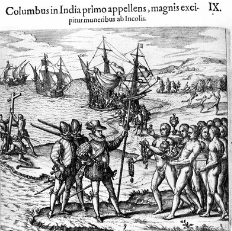
The 1492 landing of Christopher Columbus in the West Indies, engraving circa 1592 by Theodore de Bry, included in The History of America, published in Frankfurt, 1602
The image could best be used to illustrate which of the following general aspects of the initial encounters between Europeans and Native Americans?
A. European explorers were often outnumbered by Native Americans.
B. Advances in military and maritime technology usually gave Europeans an advantage over Native Americans.
C. Lack of knowledge of Native American languages hindered the Europeans' ability ti understand Native American cultures.
D. The arrival of Europeans often threatened existing hierarchies in Native American societies.
B) Advances in military and maritime technology usually gave Europeans an advantage over Native Americans.
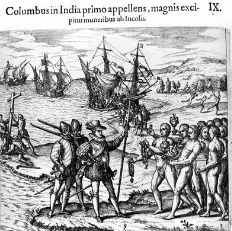
The 1492 landing of Christopher Columbus in the West Indies, engraving circa 1592 by Theodore de Bry, included in The History of America, published in Frankfurt, 1602
The image provides the most reliable information about which of the following?
A. European attitudes towards non-European peoples
B. Stylistic features of Native American art and artifacts
C. The exact geographic location of Columbus' first landing in America
D. The willingness of Native Americans to welcome the arrival of Europeans
A) European attitudes toward non-European people.
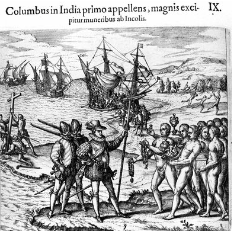
The 1492 landing of Christopher Columbus in the West Indies, engraving circa 1592 by Theodore de Bry, included in The History of America, published in Frankfurt, 1602
The image provides the clearest evidence for which of the following features of European expansion in the early modern period?
A. The spread of Christianity as a justification for the subjugation of indigenous people
B. The reliance of European colonists as indigenous peoples as sources of information about new territories
C. The rapid adoption of some European technologies by indigenous peoples
D. The creation of hybrid cultures that incorporated both European and indigenous elements
A) The spread of Christianity as a justification for the subjugation of indigenous peoples.
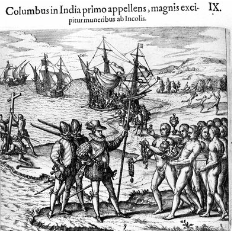
The 1492 landing of Christopher Columbus in the West Indies, engraving circa 1592 by Theodore de Bry, included in The History of America, published in Frankfurt, 1602
By the time the engraving was produced, the event portrayed had resulted in which of the following?
A. the large-scale migration of Native American peoples to Europe
B. the transfer of plants, animals, and diseases between Europe and the Americas
C. the establishment of colonies in the Americas by all major European powers
D. the creating of an extensive plantation system in the West Indies that relied on Native American coerced labor
B) the transfer of plants, animals, and diseases between Europe and the Americas.
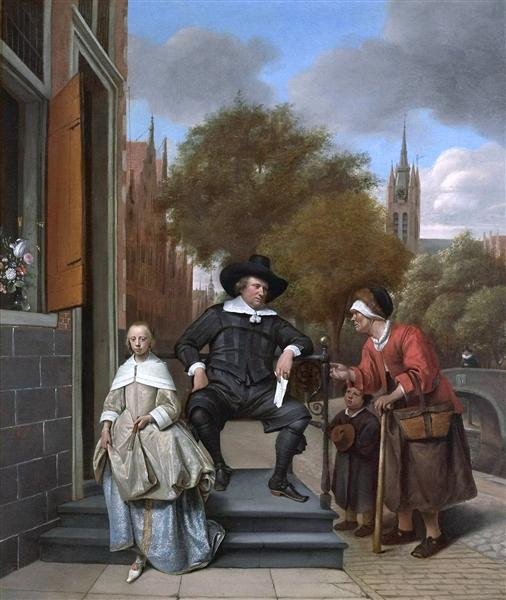
Passage: Jan steen, Dutch painter, Beware of luxury, 1663
Which of the following best explains why Steen produced paintings like the one in image 1 for wealthy Dutch merchants?
A) The merchants wished to show their Protestant rejection of Catholic imagery.
B) The merchants wished to show their support for the imposition of royal absolutism.
C) The merchants wished to show that their prosperity did not compromise their moral beliefs.
D) The merchants wished to show their knowledge of classical artistic styles and influences.
C) The merchants wished to show that their prosperity did not compromise their moral beliefs.
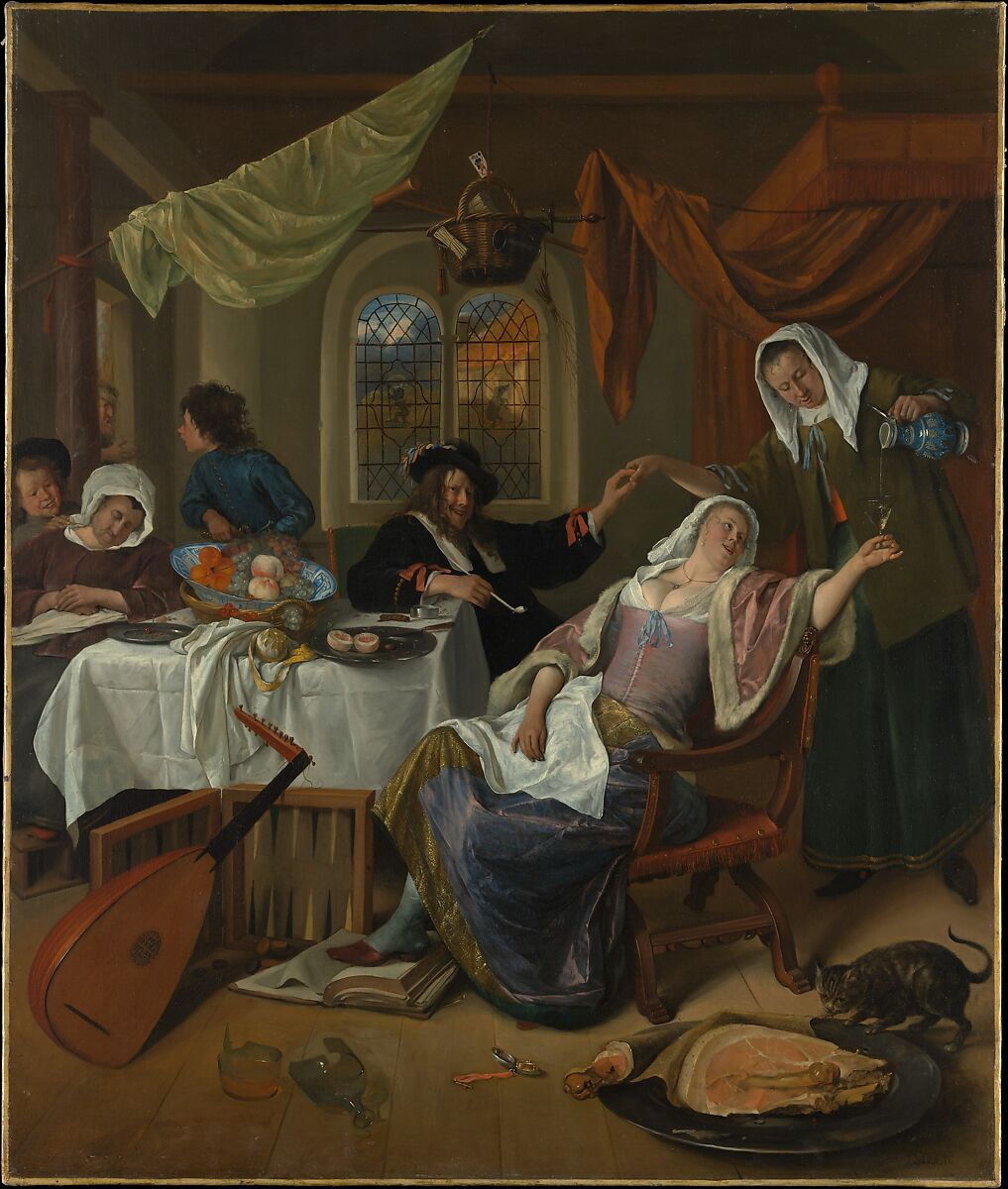
Passage: Jan steen, Dutch painter, Beware of luxury, 1663
Concern over which of the following best explains Steen's decision to portray The Dissolute Household as shown in image 2?
A) The effects of conflicts between Catholics and Protestants in the Netherlands
B) The effects of Dutch material prosperity on morality in the Netherlands
C) The effects of constitutional rule on traditional hierarchies in the Netherlands
D) The effects of cultural interactions with trading partners in Asia and Africa
B) The effects of Dutch material prosperity on morality in the Netherlands
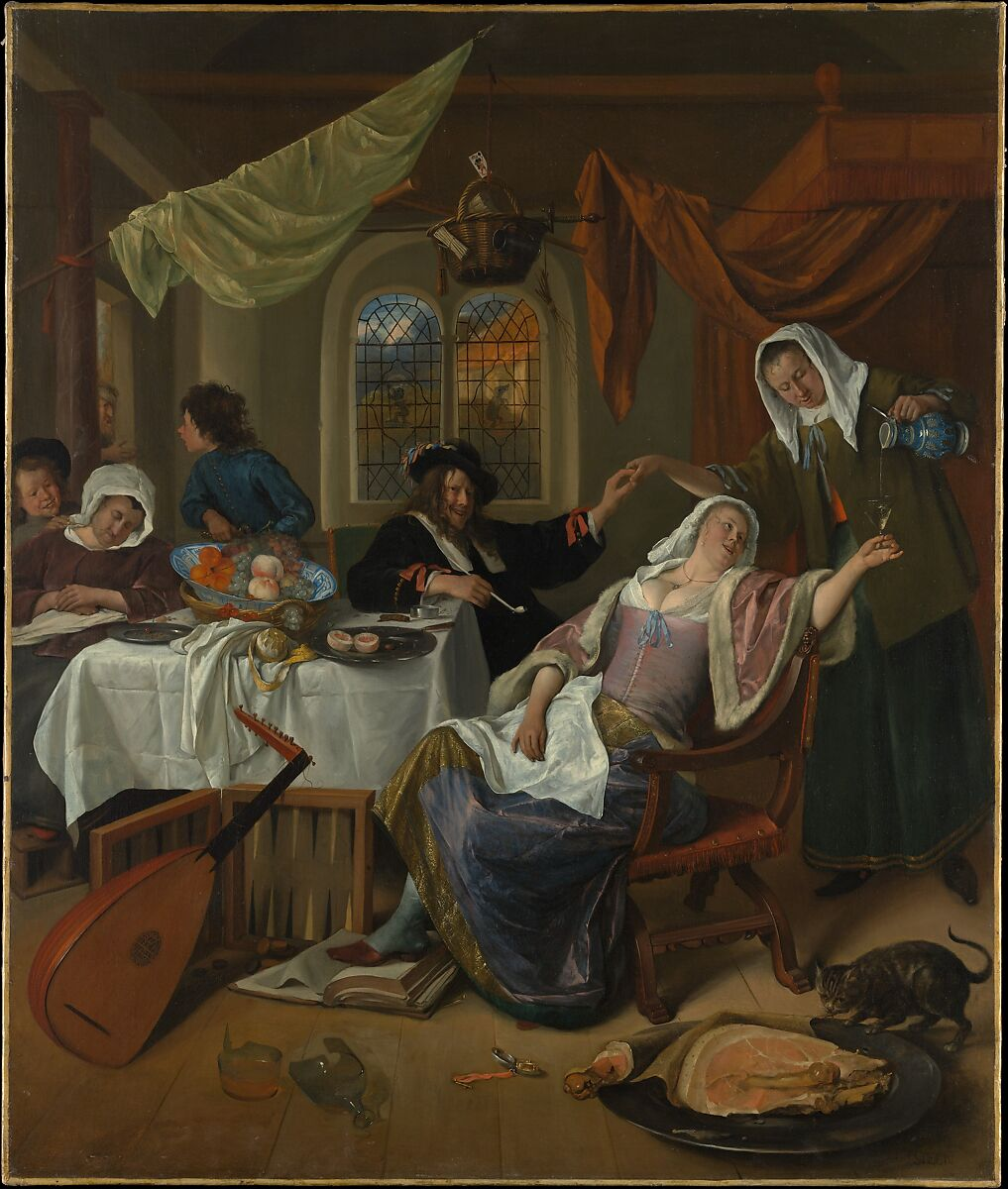
Passage: Jan steen, Dutch painter, Beware of luxury, 1663
The choice of subject matter in the two paintings is best explained by which of the following historical developments during the artist's life?
A) The Netherlands' achievement of independence from the Habsburg Empire after the Thirty Years' War
B) The establishment of religious toleration in the Netherlands after the Reformation
C) The poor harvests and other effects of the Little Ice Age in the seventeenth century
D) The growth of a wealthy trading elite in the Netherlands
D) The growth of a wealthy trading elite in the Netherlands
"I was called to England to be the arbitrator and mediator between King James and his subjects. . . . Had King James not formed the design of imposing his own religion upon all his subjects, it may be said that he would still be on the throne, but the ambition of making himself absolute and of imitating the actions of a powerful King, without possessing the same means and the same force, brought down upon himself those terrible misfortunes. . . . At the same time, these rebellious people, seeking a powerful Protector and a disinterested mediator, unfortunately cast their eyes upon me, and solicited my presence in England, and my help in securing their religious freedom.
I was in Holland, at the head of a powerful force. . . . In a short time, I found myself in London, absolute master of all things, not one of King James's subjects having had the courage or the fidelity to strike a blow in his favor. Under these conditions, in the midst of a furious people, burning with wrath against their King, I sent him secret notice to save himself, out of an excess of consideration and tenderness. I favored his flight and facilitated his departure [from England] and then, ignoring the services I had rendered him, he excited [the king of France] against me.
The Convention [Parliament] offered me the scepter, and forced me to accept it. It also forced me, in spite of myself, to allow myself to be proclaimed King, and constrained me to obey the irregularity of its election. I found myself the recipient of a crown which I am ready to renounce for the public tranquility, and for nearly five years I have reigned with that understanding."
Diplomatic correspondence from King William III of England to Pope Innocent XII, 1693
William's letter to Pope Innocent is best explained as an attempt to justify which of the following?
A) The outbreak of the English Civil War
B) The development of absolutism in England
C) The rebellion of the Netherlands against the Habsburg Empire
D) The outcome of the Glorious Revolution
D) The outcome of the Glorious Revolution
"I was called to England to be the arbitrator and mediator between King James and his subjects. . . . Had King James not formed the design of imposing his own religion upon all his subjects, it may be said that he would still be on the throne, but the ambition of making himself absolute and of imitating the actions of a powerful King, without possessing the same means and the same force, brought down upon himself those terrible misfortunes. . . . At the same time, these rebellious people, seeking a powerful Protector and a disinterested mediator, unfortunately cast their eyes upon me, and solicited my presence in England, and my help in securing their religious freedom.
I was in Holland, at the head of a powerful force. . . . In a short time, I found myself in London, absolute master of all things, not one of King James's subjects having had the courage or the fidelity to strike a blow in his favor. Under these conditions, in the midst of a furious people, burning with wrath against their King, I sent him secret notice to save himself, out of an excess of consideration and tenderness. I favored his flight and facilitated his departure [from England] and then, ignoring the services I had rendered him, he excited [the king of France] against me.
The Convention [Parliament] offered me the scepter, and forced me to accept it. It also forced me, in spite of myself, to allow myself to be proclaimed King, and constrained me to obey the irregularity of its election. I found myself the recipient of a crown which I am ready to renounce for the public tranquility, and for nearly five years I have reigned with that understanding."
Diplomatic correspondence from King William III of England to Pope Innocent XII, 1693
William's claim regarding James's "design" in the first paragraph is best explained by which of the following developments?
-Attempts to abolish the monarchy in favor of a parliamentary commonwealth
-Conflicts between the Catholic Stuart monarchy and Protestant interests in Parliament
-Powerful commercial and trade interests asserting their influence in politics
-England's policy of not intervening in the Thirty Years' War
Conflicts between the Catholic Stuart monarchy and Protestant interests in Parliament
"I was called to England to be the arbitrator and mediator between King James and his subjects. . . . Had King James not formed the design of imposing his own religion upon all his subjects, it may be said that he would still be on the throne, but the ambition of making himself absolute and of imitating the actions of a powerful King, without possessing the same means and the same force, brought down upon himself those terrible misfortunes. . . . At the same time, these rebellious people, seeking a powerful Protector and a disinterested mediator, unfortunately cast their eyes upon me, and solicited my presence in England, and my help in securing their religious freedom.
I was in Holland, at the head of a powerful force. . . . In a short time, I found myself in London, absolute master of all things, not one of King James's subjects having had the courage or the fidelity to strike a blow in his favor. Under these conditions, in the midst of a furious people, burning with wrath against their King, I sent him secret notice to save himself, out of an excess of consideration and tenderness. I favored his flight and facilitated his departure [from England] and then, ignoring the services I had rendered him, he excited [the king of France] against me.
The Convention [Parliament] offered me the scepter, and forced me to accept it. It also forced me, in spite of myself, to allow myself to be proclaimed King, and constrained me to obey the irregularity of its election. I found myself the recipient of a crown which I am ready to renounce for the public tranquility, and for nearly five years I have reigned with that understanding."
Diplomatic correspondence from King William III of England to Pope Innocent XII, 1693
William's description of his status within the English government is best explained by which of the following?
-The creation of an oligarchical system of government in William's home country of the Netherlands
-The increasing diplomatic tensions created by England's expanding colonial empire
-The assertion of parliamentary supremacy over the monarchy in the English government
-The desire of William to impose an absolutist system of government on England
The assertion of parliamentary supremacy over the monarchy in the English government
"You should know that the said King of Portugal has leased this island to Christians for ten years, so that no one can enter the bay to trade with the Arabs save those who hold the license. These Christians have dwellings on the island and factories where they buy and sell with the said Arabs who come to the coast to trade for merchandise of various kinds, such as woolen cloths, cotton, silver and coarse cloth, that is cloaks, carpets, and similar articles and above all grain, for they are always short of food. The Arabs give in exchange slaves whom the Arabs bring from the land of the Blacks, and gold dust. The King therefore caused a castle to be built on the island to protect this trade forever. For this reason, Portuguese caravels come and go all year long to this island."
Alvise de Ca'da Mosto, Venetian merchant, describing the Portuguese island of Arguim off the west coast of Africa, 1454
The Portuguese slave trade described in the passage led most directly to:
(A)Columbus' voyages of exploration
(B)The development of new navigational technology
(C)The establishment of a European-dominated system of plantation agriculture
(D)The foundation of East Indies trading companies
C.) The establishment of a European dominated system of plantation agriculture
"You should know that the said King of Portugal has leased this island to Christians for ten years, so that no one can enter the bay to trade with the Arabs save those who hold the license. These Christians have dwellings on the island and factories where they buy and sell with the said Arabs who come to the coast to trade for merchandise of various kinds, such as woolen cloths, cotton, silver and coarse cloth, that is cloaks, carpets, and similar articles and above all grain, for they are always short of food. The Arabs give in exchange slaves whom the Arabs bring from the land of the Blacks, and gold dust. The King therefore caused a castle to be built on the island to protect this trade forever. For this reason, Portuguese caravels come and go all year long to this island."
Alvise de Ca'da Mosto, Venetian merchant, describing the Portuguese island of Arguim off the west coast of Africa, 1454
The licensing of trade described in the passage is an example of which of the following state policies?
(A) The monopolization of force by the state.
(B) Their preservation of regional autonomy and tax collection.
(C) The implementation of mercantilism to promote the state's economic interests.
(D) The development of new banking techniques to enhance commerce.
c) The implementation of mercantilism to promote the states economic interests
"You should know that the said King of Portugal has leased this island to Christians for ten years, so that no one can enter the bay to trade with the Arabs save those who hold the license. These Christians have dwellings on the island and factories where they buy and sell with the said Arabs who come to the coast to trade for merchandise of various kinds, such as woolen cloths, cotton, silver and coarse cloth, that is cloaks, carpets, and similar articles and above all grain, for they are always short of food. The Arabs give in exchange slaves whom the Arabs bring from the land of the Blacks, and gold dust. The King therefore caused a castle to be built on the island to protect this trade forever. For this reason, Portuguese caravels come and go all year long to this island."
Alvise de Ca'da Mosto, Venetian merchant, describing the Portuguese island of Arguim off the west coast of Africa, 1454
Other European states reacted to the Portuguese establishment of trading-post empire by
(A) developing internal industries
(B) Shifting their focus to trading in the Mediterranean
(C) increasing overland trade with the Ottoman Empire
(D) developing rival colonies and overseas trading networks
D.) developing rival colonies and overseas trading networks
"You should know that the said King of Portugal has leased this island to Christians for ten years, so that no one can enter the bay to trade with the Arabs save those who hold the license. These Christians have dwellings on the island and factories where they buy and sell with the said Arabs who come to the coast to trade for merchandise of various kinds, such as woolen cloths, cotton, silver and coarse cloth, that is cloaks, carpets, and similar articles and above all grain, for they are always short of food. The Arabs give in exchange slaves whom the Arabs bring from the land of the Blacks, and gold dust. The King therefore caused a castle to be built on the island to protect this trade forever. For this reason, Portuguese caravels come and go all year long to this island."
Alvise de Ca'da Mosto, Venetian merchant, describing the Portuguese island of Arguim off the west coast of Africa, 1454
The long-term economic effect in Europe of the establishment of trading networks and colonies such as the one described in the passage was:
(A) the increased power of trading centers in the Italian city-states
(B) a shift in the center of economic power from the Mediterranean to the Atlantic states
(C) The Industrialization of Great Britain
(D) an increase in the cost of imported luxury goods
B.) A shift in the center of economic power from the Mediterranean to the Atlantic states
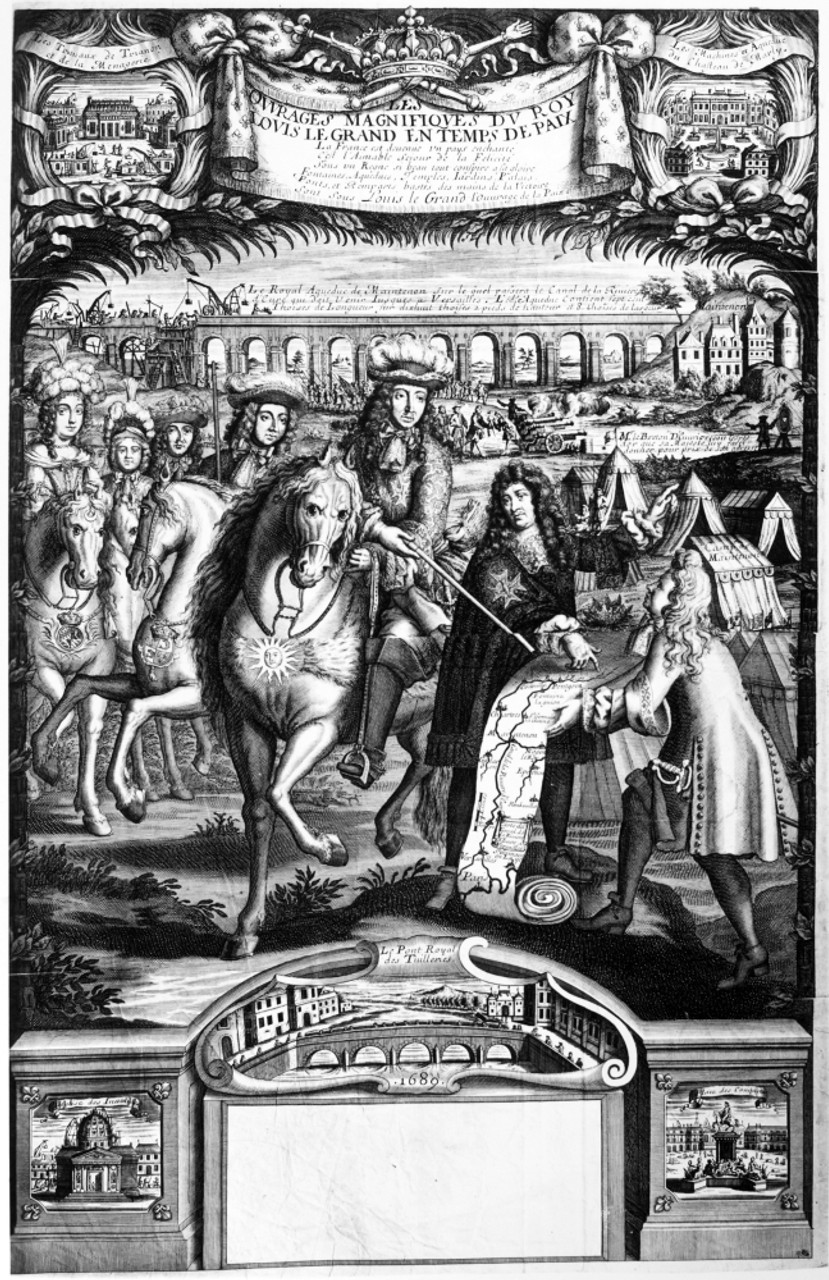
image 1: The tsar stands at the left center of the image, examining the map of the planned city while his advisers and other members of the nobility look on.
image 2: Louis XIV is at the center on horseback pointing to the plans for the aqueduct while his advisers and other nobility look on.
The activities shown in image 2 were most directly a result of which of the following developments in France?
A.) Louis's modernization of the French military through the expansion of the paid standing army
B.) Louis's expansion of monarchical administrative and financial control over France
C.) Louis's suppression of a revolt of the nobility known as the Fronde
D.) Louis's revocation of the Edict of Nantes
B.) Louis's expansion of monarchical administrative and financial control over France
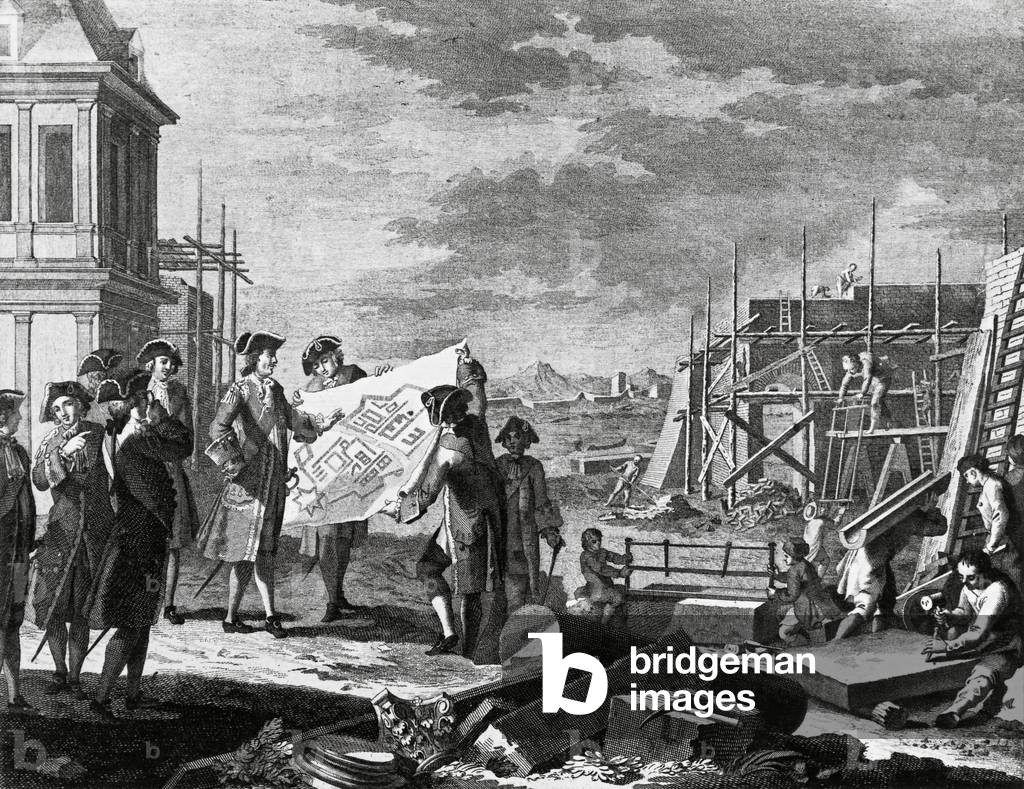
image 1: The tsar stands at the left center of the image, examining the map of the planned city while his advisers and other members of the nobility look on.
image 2: Louis XIV is at the center on horseback pointing to the plans for the aqueduct while his advisers and other nobility look on.
The activities of Peter the Great shown in image 1 were most directly the result of which of the following?
A.) Peter's reforms of the Eastern Orthodox Church
B.) Peter's efforts to westernize Russia
C.) Peter's campaigns against the Ottoman Empire
D.) Peter's suppression of rebellious nobility
B.) Peter's efforts to westernize Russia
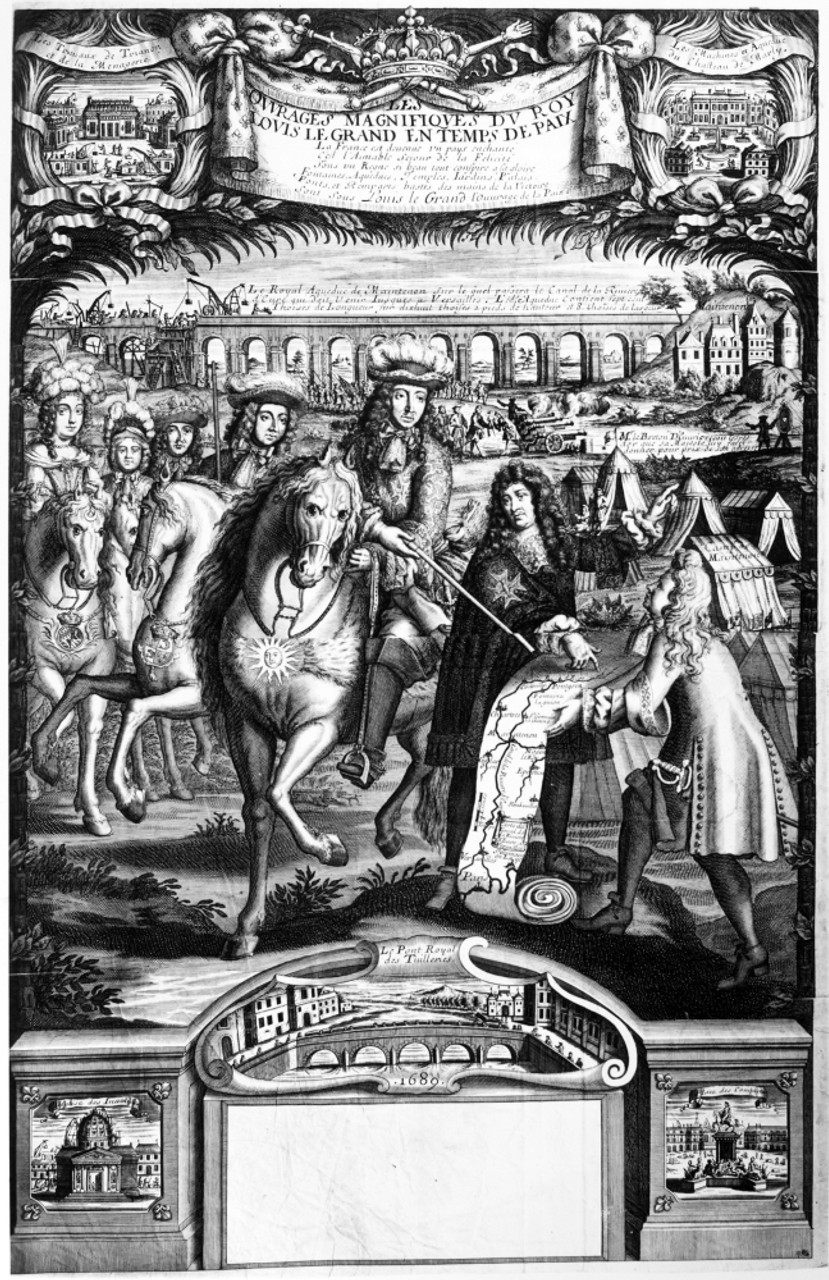
image 1: The tsar stands at the left center of the image, examining the map of the planned city while his advisers and other members of the nobility look on.
image 2: Louis XIV is at the center on horseback pointing to the plans for the aqueduct while his advisers and other nobility look on.
The presence of the aristocracy in both of the images most directly reflects a continuation of which of the following processes?
A.) The assertion of the traditional rights of the landed nobility against a centralized monarchy
B.) The development of a new commercial aristocracy as a result of growing overseas trade
C.) The modernization of the military through meritocracy and new technologies
D.) The preservation of the nobility's social status despite the absolutist authority of monarchs
D.) The preservation of the nobility's social status despite the absolutist authority of monarchs
“Let London manufacture those fabrics of hers to her heart’s content; Holland her chambrays [a fine lightweight woven fabric]; Florence her cloth; the Indies their beaver and vicuna [wool]; Milan her brocades; Italy and Flanders their linens, so long as our capital can enjoy them. The only thing it proves is that all nations train journeymen for Madrid and that Madrid is the queen of Parliaments, for all the world serves her and she serves nobody.”
Alfonso Nunez de Castro, nobleman, Spain, 1675
Which of the following best accounts for Núñez de Castro's confidence in Spain's economic position?
(B) the Spanish successes as a result of the military revolution of the sixteenth and seventeenth centuries
(C) the outcome of the Thirty Years War was established by the peace of Westphalia in 1648
(D) the influx of resources from the Spanish colonies in the Americas and the Philippines
D.) The influx of resources from the Spanish colonies in the Americas and the Philippines
Source 1
“Let London manufacture those fabrics of hers to her heart’s content; Holland her chambrays [a fine lightweight woven fabric]; Florence her cloth; the Indies their beaver and vicuna [wool]; Milan her brocades; Italy and Flanders their linens, so long as our capital can enjoy them. The only thing it proves is that all nations train journeymen for Madrid and that Madrid is the queen of Parliaments, for all the world serves her and she serves nobody.”
Alfonso Nunez de Castro, nobleman, Spain, 1675
Source 2
“The Spanish nation today possesses the greatest wealth and the largest income of all the Christians. But the love of luxuries and the comforts of civilization have overcome them, and you will rarely find one of this nation who engages in trade or travels abroad for commerce as do the other Christian nations such as the Dutch, the English, the French, the Genoese and their like. Similarly, the handicrafts practiced by the lower classes and common people are despised by this nation, which regards itself as superior to the other Christian nations. Most of these who practice these crafts in Spain are Frenchmen who flock to Spain to look for work and in a short time make great fortunes.
Muhammed al-Ghassani, Moroccan ambassador to Spain, circa 1690
Which of the following statements would the Moroccan ambassador have most likely agreed with?
(A) the practice of mercantilism is harmful to developing economy
(B) manufacturing products is better than resource extraction for economic development
B.) Manufacturing products is better than resource extraction for economic development.
Source 1
“Let London manufacture those fabrics of hers to her heart’s content; Holland her chambrays [a fine lightweight woven fabric]; Florence her cloth; the Indies their beaver and vicuna [wool]; Milan her brocades; Italy and Flanders their linens, so long as our capital can enjoy them. The only thing it proves is that all nations train journeymen for Madrid and that Madrid is the queen of Parliaments, for all the world serves her and she serves nobody.”
Alfonso Nunez de Castro, nobleman, Spain, 1675
Source 2
“The Spanish nation today possesses the greatest wealth and the largest income of all the Christians. But the love of luxuries and the comforts of civilization have overcome them, and you will rarely find one of this nation who engages in trade or travels abroad for commerce as do the other Christian nations such as the Dutch, the English, the French, the Genoese and their like. Similarly, the handicrafts practiced by the lower classes and common people are despised by this nation, which regards itself as superior to the other Christian nations. Most of these who practice these crafts in Spain are Frenchmen who flock to Spain to look for work and in a short time make great fortunes.”
Muhammed al-Ghassani, Moroccan ambassador to Spain, circa 1690
What describes the impact that the economic and political processes described in the passages would have in the eighteenth and nineteenth centuries?
Spain would fall behind England, France, and the Netherlands in economic development.
"Peter the Great was allowed to engage several English engineers into his service, as he had done in Holland; but, over and above engineers, he engaged likewise some mathematicians, which he would not so easily have found in Amsterdam. Ferguson, a Scotchman, an excellent geometrician, entered into his service, and was the first person who brought arithmetic into use in the exchequer in Russia, where before that time, they made use only of the Tartarian method of reckoning, with balls strung upon a wire [an abacus]....He took with him two young students from a mathematical school, and this was the beginning of the marine academy.... Peter made himself proficient in astronomy, [and] he perfectly well understood the motions of the heavenly bodies, as well as the laws of gravitation, by which they are directed. This force, now so evidently demonstrated, and before the time of the great Newton so little known, by which all the planets gravitate towards each other, and which retain them in their orbits, had already become familiar to a sovereign of Russia, while other countries amused themselves with imaginary theories, and, in Galileo's nation, one set of ignorant persons ordered others, as ignorant, to believe the earth to be immovable."
Voltaire, History of the Russian Empire Under Peter the Great, 1759, discussing Tsar Peter I's Grand Embassy, which traveled to Western Europe at the end of the 17thcentury
Voltaire's discussion of Peter the Great's acceptance of Newtonian physics is best understood as a critique of which of the following?
The efforts of religious and secular authorities to suppress scientific development
"Peter the Great was allowed to engage several English engineers into his service, as he had done in Holland; but, over and above engineers, he engaged likewise some mathematicians, which he would not so easily have found in Amsterdam. Ferguson, a Scotchman, an excellent geometrician, entered into his service, and was the first person who brought arithmetic into use in the exchequer in Russia, where before that time, they made use only of the Tartarian method of reckoning, with balls strung upon a wire [an abacus]....He took with him two young students from a mathematical school, and this was the beginning of the marine academy.... Peter made himself proficient in astronomy, [and] he perfectly well understood the motions of the heavenly bodies, as well as the laws of gravitation, by which they are directed. This force, now so evidently demonstrated, and before the time of the great Newton so little known, by which all the planets gravitate towards each other, and which retain them in their orbits, had already become familiar to a sovereign of Russia, while other countries amused themselves with imaginary theories, and, in Galileo's nation, one set of ignorant persons ordered others, as ignorant, to believe the earth to be immovable."
Voltaire, History of the Russian Empire Under Peter the Great, 1759, discussing Tsar Peter I's Grand Embassy, which traveled to western Europe at the end of the 17thcentury
Which of the following best explains the point of view toward Peter the Great that Voltaire expresses in the passage?
Voltaire admired rulers who governed through principles of enlightened absolutism.
"A royal, or legitimate, monarchy, is that in which the subjects obey the laws of the monarch, and the monarch obeys the laws of nature, granting his subjects their natural liberty and private property. A despotic monarchy is that in which the prince is lord of all goods and all persons by virtue of conquest . . . and governs his subjects as a father of a household rules his slaves. A tyrannical monarchy is that in which the monarch, contemptuous of the laws of nature, abuses a free people and treats them like slaves, appropriating their goods as his own."
Jean Bodin, French political philosopher, Six Lives of the Republic, 1579
Bodin's assertions about a legitimate monarchy are best understood as an example of which of the following developments in the sixteenth and seventeenth centuries?
A. The ongoing rebellion of cultural minorities against the European governments
B. The creation of alternative political systems that rejected monarchy
C. The development of new ideas concerning the value of secular systems of government
D. The continuing calls for the creation of a unified monarchy to rule over western Europe
C. The development of new ideas concerning the value of secular systems of government
"A royal, or legitimate, monarchy, is that in which the subjects obey the laws of the monarch, and the monarch obeys the laws of nature, granting his subjects their natural liberty and private property. A despotic monarchy is that in which the prince is lord of all goods and all persons by virtue of conquest . . . and governs his subjects as a father of a household rules his slaves. A tyrannical monarchy is that in which the monarch, contemptuous of the laws of nature, abuses a free people and treats them like slaves, appropriating their goods as his own."
Jean Bodin, French political philosopher, Six Lives of the Republic, 1579
Bodin's discussion of tyrannical and despotic monarchies reflects which of the following political developments in Europe?
A. The concentration of power in increasingly centralized governments
B. The increased influence of the Protestant Reformation on European politics
C. The expanding political influence of new commercial elites
D. The decreasing authority of the Papacy in international affairs
A. The concentration of power in increasingly centralized governments
"A royal, or legitimate, monarchy, is that in which the subjects obey the laws of the monarch, and the monarch obeys the laws of nature, granting his subjects their natural liberty and private property. A despotic monarchy is that in which the prince is lord of all goods and all persons by virtue of conquest . . . and governs his subjects as a father of a household rules his slaves. A tyrannical monarchy is that in which the monarch, contemptuous of the laws of nature, abuses a free people and treats them like slaves, appropriating their goods as his own."
Jean Bodin, French political philosopher, Six Lives of the Republic, 1579
Bodin's discussion of monarchical power best reflects the early stages of which of the following?
A. The growth of religious pluralism in Europe
B. The social dislocations emerging from increasing commercialization
C. The development of absolutist systems of government
D. The shift from religious to secular regulation of public morals
C. The development of absolutist systems of government
"Michael Ferrer was tried for speaking malicious words against the King on the 21st of November, 1689.
First, he stated that while King William set forth in his Declaration that he came to preserve the laws, he had altered them instead, which he would suddenly repent of.
Secondly, he stated that King William claimed he came to maintain our rights, but instead of that he came for the Crown.
Thirdly, he stated that King James was overturned unfairly, and that his rights had not been respected, etc.
The evidence presented was the testimony of one Terry, who said that Michael spoke these words to him at the Royal Exchange. The prisoner called very credible evidence to testify to his reputation, how he had always been a good Protestant, and had relinquished his office and lands in Ireland, rather than turn Catholic. So, upon the whole, the Court was well satisfied, whereupon he was acquitted."
Old Bailey Proceedings: Accounts of Criminal Trials, London, England, 1690
The "malicious words" attributed to the accused best illustrate which of the following developments in England in the late seventeenth century?
A. The effects of outbreak of the English Civil War
B. The attempt to restore Catholicism to England after the Reformation
C. The ongoing tensions between Parliament and the Crown over the limits of royal authority
D. The continuing series of military conflicts with France
C. The ongoing tensions between Parliament and the Crown over the limits of royal authority.
"Michael Ferrer was tried for speaking malicious words against the King on the 21st of November, 1689.
First, he stated that while King William set forth in his Declaration that he came to preserve the laws, he had altered them instead, which he would suddenly repent of.
Secondly, he stated that King William claimed he came to maintain our rights, but instead of that he came for the Crown.
Thirdly, he stated that King James was overturned unfairly, and that his rights had not been respected, etc.
The evidence presented was the testimony of one Terry, who said that Michael spoke these words to him at the Royal Exchange. The prisoner called very credible evidence to testify to his reputation, how he had always been a good Protestant, and had relinquished his office and lands in Ireland, rather than turn Catholic. So, upon the whole, the Court was well satisfied, whereupon he was acquitted."
Old Bailey Proceedings: Accounts of Criminal Trials, London, England, 1690
Michael Ferrer's defense best illustrates which of the following?
A. The creation of secular systems of law in European states
B. The Protestant victory in the Glorious Revolution
C. The success of Protestant missionaries in converting Irish Catholics
D. The growing application of scientific evidence to criminal proceedings
B. The Protestant victory in the Glorious Revolution
"Michael Ferrer was tried for speaking malicious words against the King on the 21st of November, 1689.
First, he stated that while King William set forth in his Declaration that he came to preserve the laws, he had altered them instead, which he would suddenly repent of.
Secondly, he stated that King William claimed he came to maintain our rights, but instead of that he came for the Crown.
Thirdly, he stated that King James was overturned unfairly, and that his rights had not been respected, etc.
The evidence presented was the testimony of one Terry, who said that Michael spoke these words to him at the Royal Exchange. The prisoner called very credible evidence to testify to his reputation, how he had always been a good Protestant, and had relinquished his office and lands in Ireland, rather than turn Catholic. So, upon the whole, the Court was well satisfied, whereupon he was acquitted."
Old Bailey Proceedings: Accounts of Criminal Trials, London, England, 1690
The outcome of the trial best illustrates which of the following?
A. The protection of the rights of the gentry and aristocracy from monarchical power
B. The continued influence of folk ideals and superstition in criminal accusations
C. The enforcement of community values through rituals of public humiliation
D. The increasing role of city governments in enforcing public morals
A. The protection of the rights of the gentry and aristocracy from monarchical power

Which of the following is an accurate description of the trend in wheat prices shown on the graph?
A) Wheat prices remained largely unchanged in the period 1650 to 1705.
B.) Wheat prices showed considerable variation but declined overall in the period 1650 to 1705.
C) Wheat prices showed considerable variation but rose overall in the period 1650 to 1705.
D) Wheat prices steadily declined in the period 1650 to 1705.
B) Wheat prices showed considerable variation but declined overall in the period 1650 to 1705

Which of the following is an accurate description of the trend in malt barley prices shown on the graph?
A) Malt barley prices increased slightly in the period 1650 to 1705.
B) Malt barley prices showed a steady decline in the period 1650 to 1705.
C) Malt barley prices showed considerable variation but no long-term change in the period 1650 to 1705.
D) Malt barley prices showed considerable variation but overall slightly declined in the period 1650 to 1705.
D) Malt barley prices showed considerable variation but overall slightly declined in a period of 1605 to 1705

Which of the following is an accurate description of the relationship between wheat prices and malt barley prices shown on the graph?
A) Wheat prices generally rose as malt barley prices fell.
B) Wheat prices and malt barley prices generally rose and fell together.
C) Wheat prices generally fell before malt barley prices did.
D) Increases and decreases in wheat and malt barley prices generally had little relationship with each other.
B) Wheat prices and malt barley prices generally rose and fell together
The following question refers to the topic of economic development in the 1700s.
The increased European consumption of luxury goods in the 1700s resulted most directly from which of the following economic developments?
A. The growth in factory-driven mass production techniques
B. The expansion of trade between Europe and other regions of the world
C. The revival of serfdom and other forms of coerced labor in parts of Europe
D. The increased effectiveness of government accounting and tax-collection practices
B. The expansion of trade between Europe and other regions of the world
The following question refers to the topic of economic development in the 1700s.
European monarchs of the 1700s mostly attempted to promote trade and consumption in luxury items by following
A. mercantilist policies that protected domestic industries and encouraged the creation of colonies
B. free trade policies that allowed countries to specialize in producing goods for which they had a competitive advantage
C. policies that emphasized economic self-sufficiency and avoided dependence on goods or resources from other countries
D. policies that created state-owned industries and wealth-redistribution programs
A. mercantilist policies that protected domestic industries and encouraged the creation of colonies
The following question refers to the topic of economic development in the 1700s.
The overall increase of European wealth best explains which of the following demographic developments in the 1700s?
A. The emigration of Europeans to overseas colonies
B. The increase in the percentage of births outside of marriage
C. The growth of urban commercial centers
D. The tendency of people to marry at younger ages
C. The growth of urban commercial centers
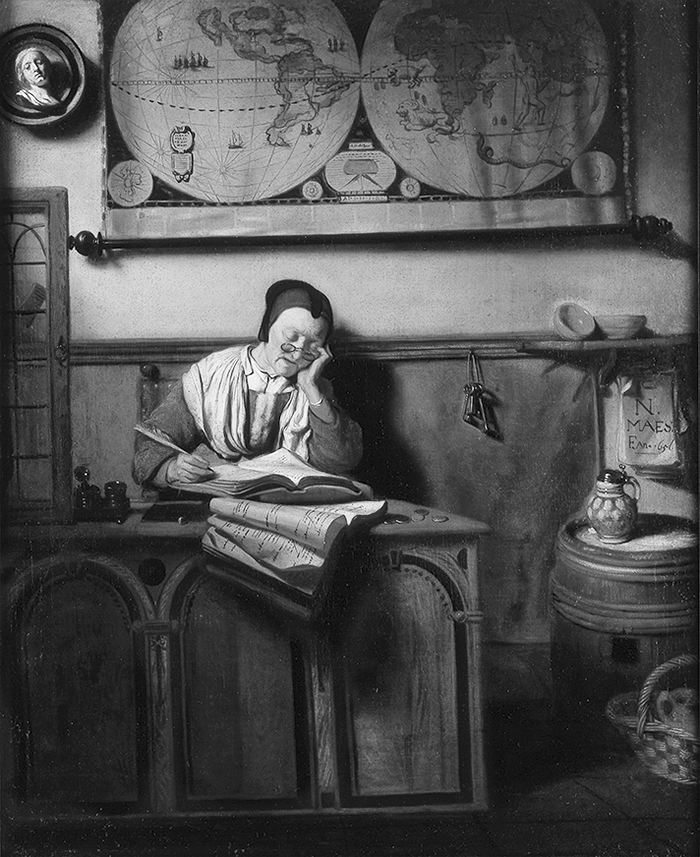
Nicolaes Maes, Dutch artist, The Account Keeper, 1656
Which of the following is the most likely explanation for Maes's choice of subject matter?
A. He wished to emulate the classically influenced works of Italian Renaissance artists.
B. He wanted to condemn the increasingly materialist outlook of Dutch society.
C. He wanted to attract the patronage of the growing Dutch urban merchant class.
D. He wanted to demonstrate that wealth and property were a sign of divine favor.
C. He wanted to attract the patronage of the growing Dutch urban merchant class.
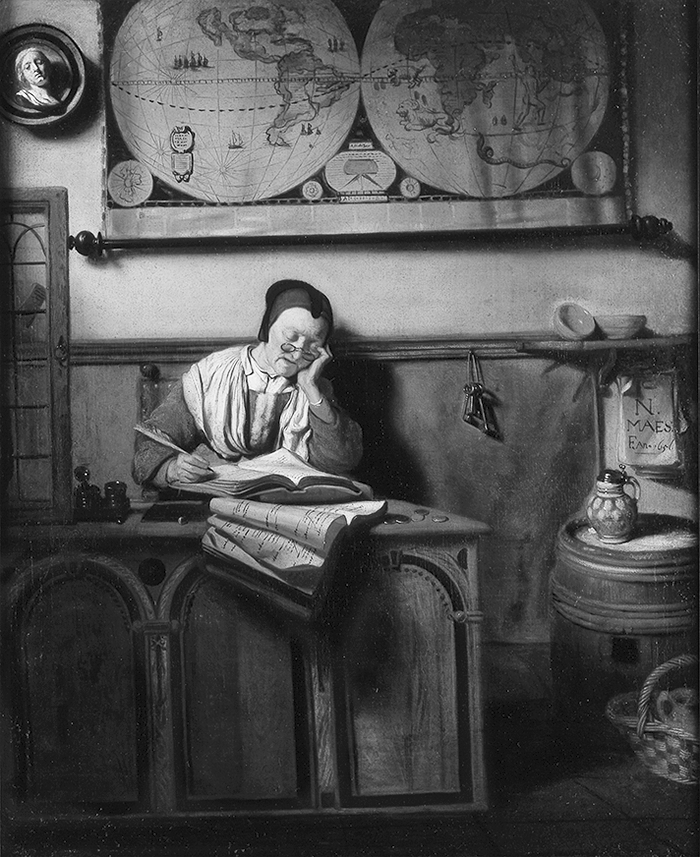
Nicolaes Maes, Dutch artist, The Account Keeper, 1656
Which of the following is the most likely explanation for Maes's inclusion of a map of the world in the painting?
A. It reflected the ongoing Dutch military campaign against the Habsburgs.
B. It reflected the growing importance of overseas trade to Dutch society.
C. It reflected the increasing influence of Asian cultural contacts on Dutch art.
D. It reflected the territorial settlements of the Peace of Westphalia.
B. It reflected the gorwing importance of overseas trade to Dutch society
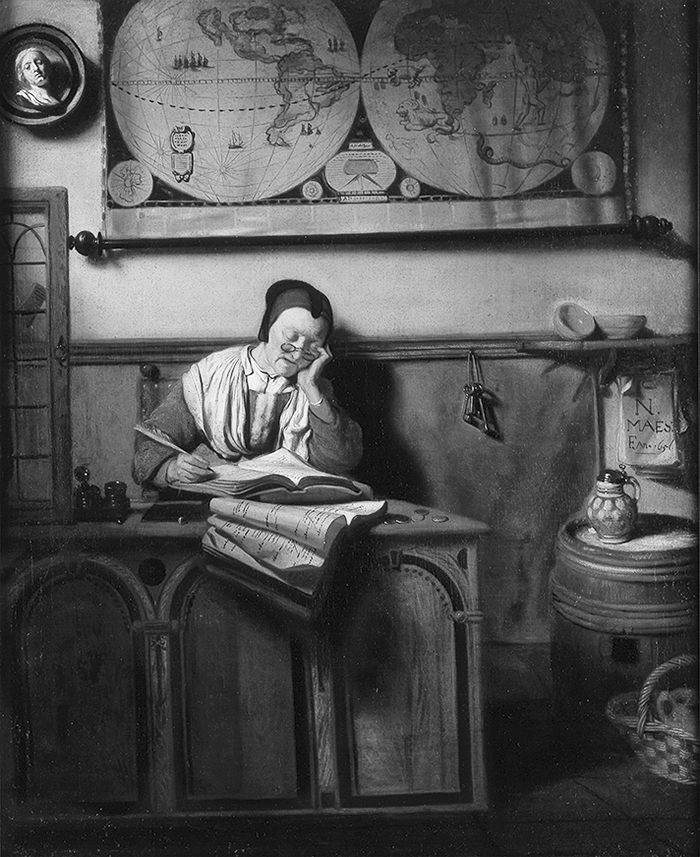
Nicolaes Maes, Dutch artist, The Account Keeper, 1656
Based on the painting, Maes most likely held which of the following views?
A. Women's labor should be restricted according to traditional guild practices.
B. Women were capable of managing the new financial practices.
C. Women should have property rights and equal legal status within marriage.
D. Women should be allowed to hold political office as members of the Dutch parliament.
B. Women were capable of managing the new financial practices
![<p>Wenceslaus Hollar, Czech artist working in the Spanish Netherlands, Allegory of the Peace of Westphalia, engraving, 1648</p><p>Two female figures representing peace and plenty look into a mirror held by an angel. The woman in armor next to the mirror represents Bellona, the Roman goddess of war and victory. Figures representing war lie prostrate in the foreground.<br>The text below reads: "Thus Peace sends forth her horn of plenty, her favors through the [Holy Roman] Empire, Spain, and France. The kings stand united, and the people are obedient under you, o great Philip [Philip IV, King of Spain], and your flourishing race. Soon war will perish and the former age will shake off all evils, and give way to a golden age."<br><strong>Which of the following best describes the claim communicated by the artist about the Peace of Westphalia?<br>A. The treaty was a catastrophe for the Catholic side.<br>B. The treaty would be only a temporary break from religious conflicts.<br>C. The treaty would bring an end to the Protestant Reformation.<br>D. The treaty would lead to a new period of peace and prosperity.</strong></p>](https://knowt-user-attachments.s3.amazonaws.com/aba02618-bc4a-4cbc-bc75-6cd5182b5442.png)
Wenceslaus Hollar, Czech artist working in the Spanish Netherlands, Allegory of the Peace of Westphalia, engraving, 1648
Two female figures representing peace and plenty look into a mirror held by an angel. The woman in armor next to the mirror represents Bellona, the Roman goddess of war and victory. Figures representing war lie prostrate in the foreground.
The text below reads: "Thus Peace sends forth her horn of plenty, her favors through the [Holy Roman] Empire, Spain, and France. The kings stand united, and the people are obedient under you, o great Philip [Philip IV, King of Spain], and your flourishing race. Soon war will perish and the former age will shake off all evils, and give way to a golden age."
Which of the following best describes the claim communicated by the artist about the Peace of Westphalia?
A. The treaty was a catastrophe for the Catholic side.
B. The treaty would be only a temporary break from religious conflicts.
C. The treaty would bring an end to the Protestant Reformation.
D. The treaty would lead to a new period of peace and prosperity.
D. The treaty would lead to a new period of peace and prosperity.
![<p>Wenceslaus Hollar, Czech artist working in the Spanish Netherlands, Allegory of the Peace of Westphalia, engraving, 1648</p><p>Two female figures representing peace and plenty look into a mirror held by an angel. The woman in armor next to the mirror represents Bellona, the Roman goddess of war and victory. Figures representing war lie prostrate in the foreground.<br>The text below reads: "Thus Peace sends forth her horn of plenty, her favors through the [Holy Roman] Empire, Spain, and France. The kings stand united, and the people are obedient under you, o great Philip [Philip IV, King of Spain], and your flourishing race. Soon war will perish and the former age will shake off all evils, and give way to a golden age."<br><strong>The artist's statement that the kings of France, Spain, and the Holy Roman Empire "stand united" most clearly suggests that<br>A. he hoped the Peace of Westphalia would bring the rival Catholic powers back together<br>B. he wanted dynastic conflicts between the Habsburgs and rival royal houses to resume<br>C. he saw all of the major European powers as collapsing under the strain of the conflict<br>D. he thought rulers of Europe needed to stand together against the expanding Ottoman Empire</strong></p>](https://knowt-user-attachments.s3.amazonaws.com/34d656f1-b946-4741-a199-ac380070f7e9.png)
Wenceslaus Hollar, Czech artist working in the Spanish Netherlands, Allegory of the Peace of Westphalia, engraving, 1648
Two female figures representing peace and plenty look into a mirror held by an angel. The woman in armor next to the mirror represents Bellona, the Roman goddess of war and victory. Figures representing war lie prostrate in the foreground.
The text below reads: "Thus Peace sends forth her horn of plenty, her favors through the [Holy Roman] Empire, Spain, and France. The kings stand united, and the people are obedient under you, o great Philip [Philip IV, King of Spain], and your flourishing race. Soon war will perish and the former age will shake off all evils, and give way to a golden age."
The artist's statement that the kings of France, Spain, and the Holy Roman Empire "stand united" most clearly suggests that
A. he hoped the Peace of Westphalia would bring the rival Catholic powers back together
B. he wanted dynastic conflicts between the Habsburgs and rival royal houses to resume
C. he saw all of the major European powers as collapsing under the strain of the conflict
D. he thought rulers of Europe needed to stand together against the expanding Ottoman Empire
A. he hoped the Peace of Westphalia would bring the rival Catholic powers back together
![<p>Wenceslaus Hollar, Czech artist working in the Spanish Netherlands, Allegory of the Peace of Westphalia, engraving, 1648</p><p>Two female figures representing peace and plenty look into a mirror held by an angel. The woman in armor next to the mirror represents Bellona, the Roman goddess of war and victory. Figures representing war lie prostrate in the foreground.<br>The text below reads: "Thus Peace sends forth her horn of plenty, her favors through the [Holy Roman] Empire, Spain, and France. The kings stand united, and the people are obedient under you, o great Philip [Philip IV, King of Spain], and your flourishing race. Soon war will perish and the former age will shake off all evils, and give way to a golden age."<br><strong>The presence of Bellona and the statement that "the people are obedient under you, o great Philip" best support the argument that the artist<br>A. favored the independence of the Dutch Republic<br>B. wished to portray the Catholic Habsburgs as the victors<br>C. was unfamiliar with classical humanist thought<br>D. rejected Christian influence on his art</strong></p>](https://knowt-user-attachments.s3.amazonaws.com/77163b67-7204-4a99-9da9-e9bd30373aa8.png)
Wenceslaus Hollar, Czech artist working in the Spanish Netherlands, Allegory of the Peace of Westphalia, engraving, 1648
Two female figures representing peace and plenty look into a mirror held by an angel. The woman in armor next to the mirror represents Bellona, the Roman goddess of war and victory. Figures representing war lie prostrate in the foreground.
The text below reads: "Thus Peace sends forth her horn of plenty, her favors through the [Holy Roman] Empire, Spain, and France. The kings stand united, and the people are obedient under you, o great Philip [Philip IV, King of Spain], and your flourishing race. Soon war will perish and the former age will shake off all evils, and give way to a golden age."
The presence of Bellona and the statement that "the people are obedient under you, o great Philip" best support the argument that the artist
A. favored the independence of the Dutch Republic
B. wished to portray the Catholic Habsburgs as the victors
C. was unfamiliar with classical humanist thought
D. rejected Christian influence on his art
B. wished to portray the Catholic Habsburgs as the victors
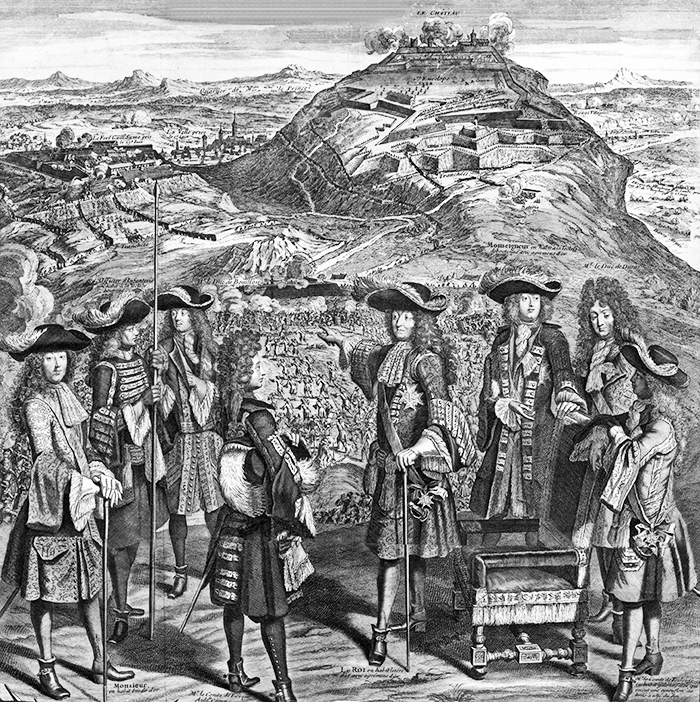
The Capture of Namur, engraving by an unknown artist, 1692
The engraving shows the French army's siege and capture of the town of Namur, in the Spanish Netherlands, from Spanish and Dutch forces during the Nine Years' War. Louis XIV is shown in the center, surrounded by his son and various members of the nobility.
The event shown in the engraving is associated with the development of which of the following forms of government in Europe in the seventeenth century?
A. Absolutism
B. Constitutionalism
C.Elective monarchy
D. Theocracy
A. Absolutism
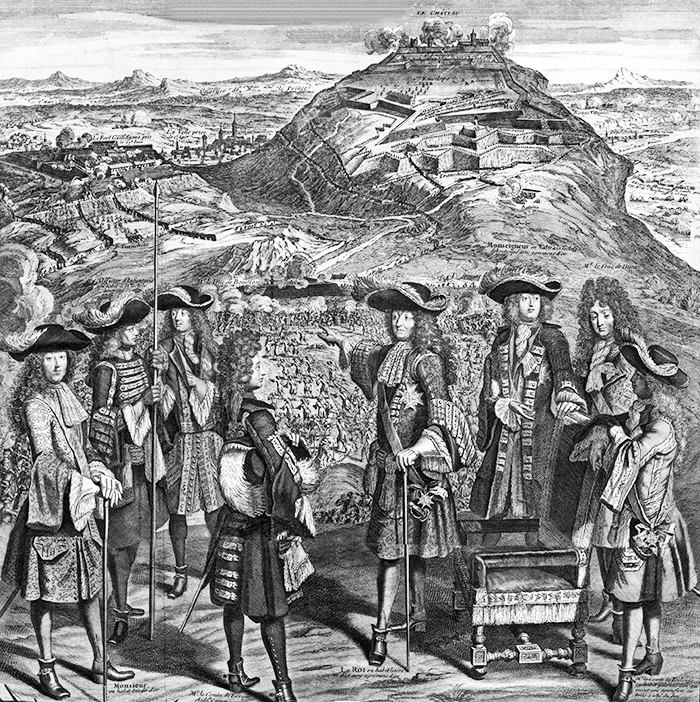
The Capture of Namur, engraving by an unknown artist, 1692
The engraving shows the French army's siege and capture of the town of Namur, in the Spanish Netherlands, from Spanish and Dutch forces during the Nine Years' War. Louis XIV is shown in the center, surrounded by his son and various members of the nobility.
The depiction of the scene in the engraving best illustrates which of the following aspects of the French aristocracy under Louis XIV's rule?
A. The maintenance of the aristocracy's privileged social position
B. The financial difficulties experienced by many members of the aristocracy in attempting to support their lifestyle
C. The displacement of the aristocracy from many key administrative posts
D. The continued rivalries among aristocratic factions seeking royal favor
A. The maintenance of the aristocracy's privileged social position
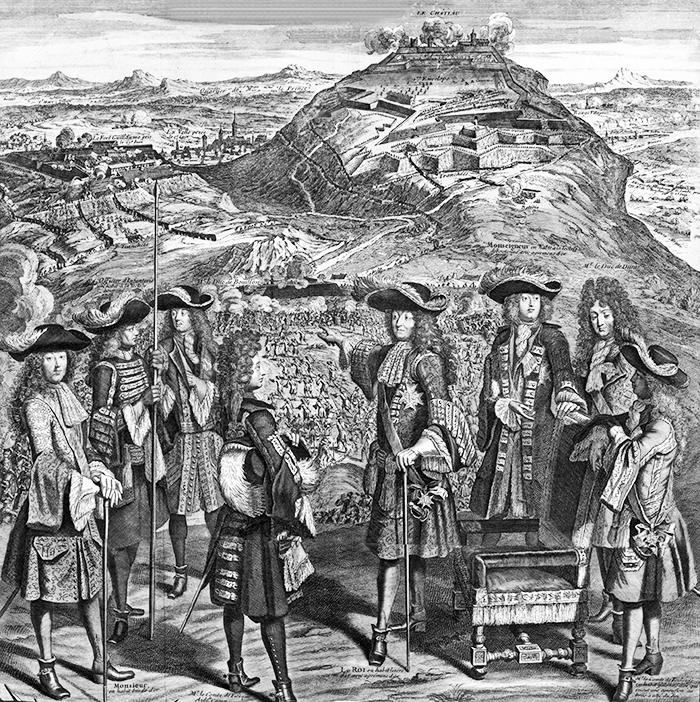
The Capture of Namur, engraving by an unknown artist, 1692
The engraving shows the French army's siege and capture of the town of Namur, in the Spanish Netherlands, from Spanish and Dutch forces during the Nine Years' War. Louis XIV is shown in the center, surrounded by his son and various members of the nobility.
Military operations such as the one shown in the engraving were most strongly supported by which of the following features of Louis XIV's government?
A. The establishment of a state monopoly on trade with the settlements of New France in North America
B. The creation of a strong centralized system of taxation and state finance
C. The opening of the senior officer ranks to middle-class men of proven talent and loyalty
D. The encouragement of agricultural improvements to increase the food supply
B. The creation of a strong centralized system of taxation and state finance
"Anno Domini 1618, a great comet appeared in November. To see the thing was terrible and strange, and it moved me and changed my disposition so that I started to write, because I thought that it meant something big would occur, as then really did happen. . . . Anno Domini 1619, Ferdinand became the Holy Roman Emperor, under whom a great persecution happened through war, unrest, and the spilling of the blood of Christians. . . . First, he started a big war in Bohemia, which he then oppressed and subjugated under his religion, then almost the whole of Germany was conquered, all of which I can hardly describe and explain."
Hans Herberle, shoemaker in Ulm, southern Germany, personal chronicle compiled in the 1630s
The ability of someone of Herberle's social status in seventeenth-century Germany to read and write was most likely the result of which of the following?
The Protestant Reformation's emphasis on individual study of the Bible
"I traveled to Montpellier [in southern France] and associated there with several Protestants who have close contacts with Spain in order to learn if they ship books to Spain or know any heretics there. In order to gather this information...I pretended to be a heretic myself and proposed to take some books, such as the works of John Calvin and Theodore Beza, to Spain....A bookseller and a merchant volunteered to bring the books secretly to Barcelona to the home of one of their friends who was, as they said, of their faith. A thousand deceptions were necessary to gather this information....I learned the names of all [Protestants] from the merchant, for he told me that they were of his religion. I am staying here...in the service of God and Your Majesty."
Report by an agent of the Spanish Inquisition to King Philip II, 1566
Which of the following is best supported by the passage?
Owning and reading Protestant religious literature was illegal in Spain.
"I traveled to Montpellier [in southern France] and associated there with several Protestants who have close contacts with Spain in order to learn if they ship books to Spain or know any heretics there. In order to gather this information...I pretended to be a heretic myself and proposed to take some books, such as the works of John Calvin and Theodore Beza, to Spain....A bookseller and a merchant volunteered to bring the books secretly to Barcelona to the home of one of their friends who was, as they said, of their faith. A thousand deceptions were necessary to gather this information....I learned the names of all [Protestants] from the merchant, for he told me that they were of his religion. I am staying here...in the service of God and Your Majesty."
Report by an agent of the Spanish Inquisition to King Philip II, 1566
How did Philip II's religious policies illustrated in the passage compare to the policies pursued by other fifteenth- and sixteenth-century European monarchs?
Philip's policies controlling religious beliefs and practices were similar to the policies of most other monarchs at the time.
"They are ungrateful, changeable, simulators and dissimulators, runaways in danger, eager for gain; while you do well by them they are all yours; they offer you their blood, their property, their lives, their children when need is far off; but when it comes near you, they tum about."
The political assessment above of Renaissance citizens can be found in
Machiavelli's The Prince
"If a Prince wants to maintain his rule, he must learn how not to be virtuous, and to make use of this or not according to his need."
The passage above best reflects the argument of
Machiavelli
"Assume, O men of the German lands, that ancient spirit of yours with which you so often confounded and terrified the Romans and turn your eyes to the frontiers of Germany; collect her torn and broken territories. Let us be ashamed, ashamed I say, to have placed upon our nation the yoke of slavery. . . . O free and powerful people, O noble and valiant race. . . . To such an extent are we corrupted by Italian sensuality and by fierce cruelty in extracting filthy profit that it would have been far more holy and reverent for us to practice that rude and rustic life of old, living within the bounds of self-control, than to have imported the paraphernalia of sensuality and greed which are never sated, and to have adopted foreign customs."
Conrad Celtis, oration delivered at the University of Ingolstadt, 1492
The passage above most clearly shows the influence of which of the following trends in fifteenth-century Europe?
The revival of classical learning and the development of Northern humanism
"Our sins have their source in Adam, and because Adam ate the apple, we have inherited sin from him. But Christ has shattered death in order that we might be saved by His works and not by our works. Christ says: I am your justification."
Martin Luther
Which of the following best describes Luther's meaning in the excerpt above?
Only faith in Christ will bring salvation, not good works.
"At about this time there came to my notice the harm and havoc that were being wrought in France by these Lutherans [Protestants] and the way in which their unhappy sect was increasing. This troubled me very much, and, as though I could do anything, or be of any help in the matter, I wept before the Lord and entreated Him to remedy this great evil. I felt that I would have laid down a thousand lives to save a single one of all the souls that were being lost there.
And, seeing that I was a woman, and a sinner, and incapable of doing all I should like in the Lord's service, and as my whole yearning was, and still is, that, as He has so many enemies and so few friends, these last should be trusty ones, I determined to do the little that was in me—namely, to follow the evangelical counsels as perfectly as I could, and to see that these few nuns who are here should do the same, confiding in the great goodness of God, Who never fails to help those who resolve to forsake everything for his sake. . . . Thou, o God, did not despise women, but did always help them and show great compassion. Thou did find more faith and no less love in them than in men, and one of them was Thy most sacred Mother, from whose merits we derive merit, and whose habit we wear, though our sins make us unworthy to do so."
St. Teresa of Ávila, Spanish nun, The Way of Perfection, 1577
Which of the following was the likely purpose of St. Teresa's Way of Perfection?
To justify the reform of a Catholic religious order, the Carmelites
"Among the various species or modifications of liberty, of which on different occasions we have heard so much in England, I do not recollect ever seeing any thing yet offered on behalf of the liberty of making one's own terms in money lending....No man of ripe years and of sound mind, acting freely, and with his eyes open, ought to be hindered, with a view to his advantage, from making such bargain, in the way of obtaining money, as he thinks fit: nor, (what is a necessary consequence) any body hindered from supplying him, upon any terms he thinks proper to accede to.... You, who fetter contracts; you, who lay restraints on the liberty of man, it is for you to assign a reason for your doing so."
Jeremy Bentham, Defence of Usury [Charging of Interest], 1787
Bentham's argument exemplifies which of the following processes at work in eighteenth-century Europe?
The loosening of traditional moral restrictions on economic activity
"Concerning the Times of Assembling at Church: That the churches be closed for the rest of the time [outside the time of services], in order that no one shall enter therein out of hours, impelled there to by superstition; and if anyone be found engaged in any special act of devotion therein or nearby he shall be admonished for it; if it be found to be of a superstitious nature for which simple correction is inadequate, then he shall be chastised.
Drunkenness: That taverns shall be closed during the sermon, under penalty that the tavern-keeper shall pay three sous, and whoever may be found therein shall pay the same amount.
If anyone be found intoxicated he shall pay for the first offense three sous and shall be remanded to the consistory [church council or governing body].
That no one shall make roiaumes [popular festivals] under penalty of 10 sous.
Songs and Dances: If anyone sings immoral, dissolute or outrageous songs, or dances the virollet or otherdance, he shall be put in prison for three days and then sent to the consistory.
Usury: That no one shall take interest or profit of more than five percent, upon penalty of confiscation of the principal and of being condemned to make restitution as the case may demand."
Ordinances of Calvinist Geneva, 1547
A historian could best use the ordinance about usury as an example of
a traditional restriction on market activities
"That the pretended powers of suspending of laws or the execution of laws by regal authority without consent of Parliament is illegal.
That levying money for or to the use of the Crown by pretence of prerogative without grant of Parliament for longer time or in other manner than the same is illegal."
The provisions above from the English Bill of Rights were enacted in response to
James II's attempts to dominate Parliament
"He desired glory and excellence beyond that of anyone else. He showed favor to vernacular poetry and all the fine arts. Under him the city was not free, but it would have been impossible for it to have had a better or more pleasing tyrant."
The passage above most accurately describes
Lorenzo de' Medici
" I travelled to Montpellier and associated with several Protestants who have close contacts with Spain in order to learn if they ship books to Spain or know any heretics there. In order to gather this information... I pretended to be a heretic myself and proposed to take some books , such as the works of John Calvin and Theodore Beza to Spain A bookseller and a merchant volunteered to bring the books secretly to Barcelona to the home of one of their friends who was as they said, of their faith. A thousand deceptions were necessary to gather this info. I learned the names of all Protestants from the merchant for he told me that they were of his religion . I am staying here... in the service of God and Your Majesty." - Report by an agent of the Spanish Inquisition to king Phillip 2 ,1566
Which of the following is best supported by the passage?
a) The Spanish government used agents of the Inquisition as ambassadors to neighboring countries
b) Barcelona was the center of Protestant activity in Sapin
c) owning protestant religious literature was illegal in Spain
c) Owning and reading Protestant religious literature was illegal in Spain
" I travelled to Montpellier and associated with several Protestants who have close contacts with Spain in order to learn if they ship books to Spain or know any heretics there. In order to gather this information... I pretended to be a heretic myself and proposed to take some books , such as the works of John Calvin and Theodore Beza to Spain A bookseller and a merchant volunteered to bring the books secretly to Barcelona to the home of one of their friends who was as they said, of their faith. A thousand deceptions were necessary to gather this info. I learned the names of all Protestants from the merchant for he told me that they were of his religion . I am staying here... in the service of God and Your Majesty." - Report by an agent of the Spanish Inquisition to king Phillip 2 ,1566
The events described in the passage best illustrate which of the following aspect of religious conflicts in Europe in the 16th centuries ?
a) Catholics responded to the challenge of the Protestant Reformation by creating new religious orders to revitalize the Roman Catholic Church
b) The spread of Protestant ideas in France had already resulted in the French monarch adopting a policy of religious toleration
c) Protestants made effective use of the increased availability of printing technology to spread their ideas
C) Protestants made effective use of the increased availability of printing technology to spread their ideas
" I travelled to Montpellier and associated with several Protestants who have close contacts with Spain in order to learn if they ship books to Spain or know any heretics there. In order to gather this information... I pretended to be a heretic myself and proposed to take some books , such as the works of John Calvin and Theodore Beza to Spain A bookseller and a merchant volunteered to bring the books secretly to Barcelona to the home of one of their friends who was as they said, of their faith. A thousand deceptions were necessary to gather this info. I learned the names of all Protestants from the merchant for he told me that they were of his religion . I am staying here... in the service of God and Your Majesty." - Report by an agent of the Spanish Inquisition to king Phillip 2 ,1566
How did Phillip's religious policies illustrated in the passage compare to the policies pursued by other 15th and 16th century European Monarchs?
a) Philip's policies were unique among European monarchs because Philip strongly supported Catholicism
b) Philip's policies enforcing religious uniformity were similar to the policies of other Habsburg rulers but different from the policies of most other ruling dynasties
c) Philip's policies controlling religious beliefs and practices were similar to the policies of most other monarchs at the time.
C) Phillips policies controlling religious beliefs and practices were similar to the policies of the most other monarchs at the time.
" I travelled to Montpellier and associated with several Protestants who have close contacts with Spain in order to learn if they ship books to Spain or know any heretics there. In order to gather this information... I pretended to be a heretic myself and proposed to take some books , such as the works of John Calvin and Theodore Beza to Spain A bookseller and a merchant volunteered to bring the books secretly to Barcelona to the home of one of their friends who was as they said, of their faith. A thousand deceptions were necessary to gather this info. I learned the names of all Protestants from the merchant for he told me that they were of his religion . I am staying here... in the service of God and Your Majesty." - Report by an agent of the Spanish Inquisition to king Phillip 2 ,1566
Which of the following events marked the effective end of Spain's ability to act as a champion of Catholicism in Europe?
a) The Battle of Lepanto
b) The outcome of the 30 years War
c) The Siege of Vienna
d) The outcome of the 7 years War
C) The outcome of the Thirty Years War (1648)
The following question refers to the topic of economic development in the 1700s.
The expansion of the transatlantic slave trade in the 1700s is best explained by which of the following developments?
-Great Britain's increasing dominance of the world trading economy
-Growth in European demand for New World agricultural products
-Growing shortages of labor in Europe
-Decrease in the cost of labor in Europe
Growth in European demand for New World agricultural products
"Power [is] one of the most necessary ingredients towards the grandeur of kings, and the prosperity of their governments. . . . As goodness is the object of love, power is the cause of dread, and it is most certain, that among all the principles that are capable of affecting a state, fear grounded upon esteem and reverence has so much force, that it engages everyone to perform his duty.
If this principle is of great efficacy in respect to the internal part of states, it is to the full as prevailing abroad: subjects and strangers looking with the same eyes upon a formidable power, both the one and the other abstain from offending a prince, whom they are sensible is in a condition to hurt them, if he were so inclined.
I have observed by the by, that the ground of the power I am speaking of must be esteem and respect; . . . that when it is grounded on any other principle, it is very dangerous; in the case instead of creating a reasonable fear, it inclines men to hate princes. . . .
The Prince must be powerful by his reputation.
By a reasonable army always kept on foot.
And by a notable sum of money in his coffers, to supply unexpected demands, which often come to pass when they are least expected.
Finally, by the possession of his subjects' hearts."
Cardinal Richelieu, advisor to the French king Louis XIII, Political Will and Testament, 1638
Richelieu's ideas best reflect which of the following developments in Europe during the 1600s?
A) The effects of the Thirty Years' War on religious policies of European governments
B) The development of constitutionalism as a form of government in Europe
C) The creation of new systems of government that centralized state power
D) The attempt to reunify Europe under a Catholic monarchy
C) The creation of new systems of government that centralized state power
"Power [is] one of the most necessary ingredients towards the grandeur of kings, and the prosperity of their governments. . . . As goodness is the object of love, power is the cause of dread, and it is most certain, that among all the principles that are capable of affecting a state, fear grounded upon esteem and reverence has so much force, that it engages everyone to perform his duty.
If this principle is of great efficacy in respect to the internal part of states, it is to the full as prevailing abroad: subjects and strangers looking with the same eyes upon a formidable power, both the one and the other abstain from offending a prince, whom they are sensible is in a condition to hurt them, if he were so inclined.
I have observed by the by, that the ground of the power I am speaking of must be esteem and respect; . . . that when it is grounded on any other principle, it is very dangerous; in the case instead of creating a reasonable fear, it inclines men to hate princes. . . .
The Prince must be powerful by his reputation.
By a reasonable army always kept on foot.
And by a notable sum of money in his coffers, to supply unexpected demands, which often come to pass when they are least expected.
Finally, by the possession of his subjects' hearts."
Cardinal Richelieu, advisor to the French king Louis XIII, Political Will and Testament, 1638
Which of the following most directly influenced Richelieu's views on the power of the king?
A) The passage of the Edict of Nantes guaranteeing religious tolerance for French Protestants
B) The growing rivalries with other European powers for overseas colonies
C) The increasing political status of the new merchant class in France
D) The challenges posed to the French government during uprisings by the nobility
D) The challenges posed to the French government during uprisings by the nobility
"Power [is] one of the most necessary ingredients towards the grandeur of kings, and the prosperity of their governments. . . . As goodness is the object of love, power is the cause of dread, and it is most certain, that among all the principles that are capable of affecting a state, fear grounded upon esteem and reverence has so much force, that it engages everyone to perform his duty.
If this principle is of great efficacy in respect to the internal part of states, it is to the full as prevailing abroad: subjects and strangers looking with the same eyes upon a formidable power, both the one and the other abstain from offending a prince, whom they are sensible is in a condition to hurt them, if he were so inclined.
I have observed by the by, that the ground of the power I am speaking of must be esteem and respect; . . . that when it is grounded on any other principle, it is very dangerous; in the case instead of creating a reasonable fear, it inclines men to hate princes. . . .
The Prince must be powerful by his reputation.
By a reasonable army always kept on foot.
And by a notable sum of money in his coffers, to supply unexpected demands, which often come to pass when they are least expected.
Finally, by the possession of his subjects' hearts."
Cardinal Richelieu, advisor to the French king Louis XIII, Political Will and Testament, 1638
The views of power expressed by Richelieu are best understood as an early example of which of the following developments?
A) The establishment of absolutist principles of monarchical government across Europe
B) The protection of traditional rights by a coalition of urban and rural interests
C) The decline of religion as a cause for warfare after the Peace of Westphalia
D) The growth of religious pluralism as a feature of European politics and society
A) The establishment of absolutist principles of monarchical government across Europe
"It is necessary to conduct yourself as a good father to your people, that you love your subjects regardless of their religious convictions, and that you try to promote their welfare at all times. Work to stimulate trade everywhere, and keep in mind the population increase of [your territories]. Take advantage of the advice of the clergy and nobility as much as you can; listen to them and be gracious to them all, as befits your position; recognize ability where you find it, so that you will increase the love and affection of your subjects toward you. . . .
Seek to maintain friendly relations with the princes and nobility of the [Holy Roman] Empire. Correspond with them frequently and maintain your friendship with them. Be certain not to give them cause for ill will; try not to arouse emotions of jealousy or enmity, but be sure that you are in a strong position to maintain your weight in disputes that may arise. . . .
It is wise to have alliances, if necessary, but it is better to rely on your own strength. You are in a weak position if you do not have the means and do not possess the confidence of the people. These are the things, God be praised, which have made me powerful since the time I began to have them."
Frederick William, the Great Elector of Brandenburg-Prussia, secret letter to his son and heir, 1667
Which of the following best summarizes the advice given by Frederick William in the first paragraph?
A) A good leader should instill fear in the population.
B) It is not necessary to tolerate other religions.
C) Exploit the church for the enrichment of the state.
D) Helping the people will strengthen the state.
D) Helping the people will strengthen the state.
"It is necessary to conduct yourself as a good father to your people, that you love your subjects regardless of their religious convictions, and that you try to promote their welfare at all times. Work to stimulate trade everywhere, and keep in mind the population increase of [your territories]. Take advantage of the advice of the clergy and nobility as much as you can; listen to them and be gracious to them all, as befits your position; recognize ability where you find it, so that you will increase the love and affection of your subjects toward you. . . .
Seek to maintain friendly relations with the princes and nobility of the [Holy Roman] Empire. Correspond with them frequently and maintain your friendship with them. Be certain not to give them cause for ill will; try not to arouse emotions of jealousy or enmity, but be sure that you are in a strong position to maintain your weight in disputes that may arise. . . .
It is wise to have alliances, if necessary, but it is better to rely on your own strength. You are in a weak position if you do not have the means and do not possess the confidence of the people. These are the things, God be praised, which have made me powerful since the time I began to have them."
Frederick William, the Great Elector of Brandenburg-Prussia, secret letter to his son and heir, 1667
Which of the following best summarizes the advice given by Frederick William in the second paragraph?
A) Cultivate good relations with your neighbors in case of disputes.
B) Keep a strong army to exploit the weakness of rival states.
C) Use disputes between the princes and the Holy Roman Emperor to your advantage.
D) Back down when confronted by rival states in order to avoid war.
A) Cultivate good relations with your neighbors in case of disputes.
"It is necessary to conduct yourself as a good father to your people, that you love your subjects regardless of their religious convictions, and that you try to promote their welfare at all times. Work to stimulate trade everywhere, and keep in mind the population increase of [your territories]. Take advantage of the advice of the clergy and nobility as much as you can; listen to them and be gracious to them all, as befits your position; recognize ability where you find it, so that you will increase the love and affection of your subjects toward you. . . .
Seek to maintain friendly relations with the princes and nobility of the [Holy Roman] Empire. Correspond with them frequently and maintain your friendship with them. Be certain not to give them cause for ill will; try not to arouse emotions of jealousy or enmity, but be sure that you are in a strong position to maintain your weight in disputes that may arise. . . .
It is wise to have alliances, if necessary, but it is better to rely on your own strength. You are in a weak position if you do not have the means and do not possess the confidence of the people. These are the things, God be praised, which have made me powerful since the time I began to have them."
Frederick William, the Great Elector of Brandenburg-Prussia, secret letter to his son and heir, 1667
Which of the following best summarizes the advice given by Frederick William in the third paragraph?
A) Alliances are essential to the strength of the state.
B) Alliances made by the ruler must have the approval of the people.
C) Alliances are useful, but a state should rely on its own strength.
D) Alliances should never compromise the ruler's religious beliefs.
C) Alliances are useful, but a state should rely on its own strength.
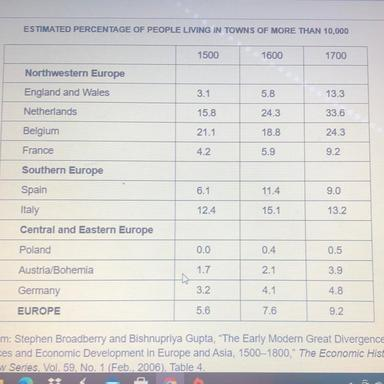
URBANIZATION TABLE 1500 to 1700
According to the table, which of the following countries experienced the greatest proportional increase in urbanization between 1500 and 1700?
A) Austria/Bohemia
B) Belgium
C) England and Wales
D) Italy
C) England and Wales
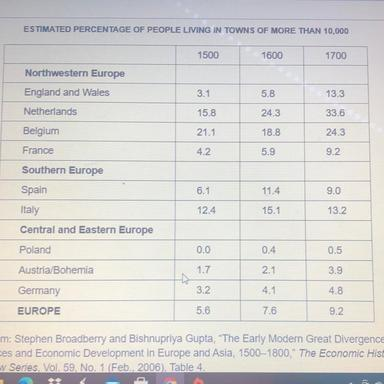
URBANIZATION TABLE 1500 to 1700
Which of the following overall trends is indicated by the data in the table?
A) Europe was less urbanized in 1700 than it was in 1500.
B) Europe was more urbanized in 1700 than it was in 1500.
C) Southern Europe urbanized more rapidly than other regions of Europe did from 1500 to 1700.
D) The average size of European towns remained about the same in the period 1500 to 1700.
B) Europe was more urbanized in 1700 than it was in 1500.
"Peoples of these long-oppressed, German lands! As a German I come among you, long-lost brothers who have been won back at great cost! To return you freedom, independence, honor, and happiness in the name of generous-hearted monarchs. Prove yourselves worthy of such great gifts. Earn the blood that has flowed on your behalf. Make willing and immediate sacrifice to secure an honorable, happy future. Seek to earn and preserve what the victorious allied armies* have given you.
Remember the noble German princes, whose rule was happy and who remained worthy in good times and bad. Think of the great Imperial union and the common language, which binds you with us in perpetuity. Prove yourselves worthy of being German, and you will remain so."
* a reference to the forces of Russia, Prussia, and Austria that had defeated Napoleon in Germany the previous year
Declaration of Justus Gruner, newly appointed governor-general of the Middle Rhine region after Napoleon's retreat from Germany, 1814
Which of the following best explains why many saw Napoleon as an oppressor, as stated in the passage?
A) He imposed the Code Napoleon, a system of laws based on French revolutionary principles, on territories conquered by his armies.
B) While he created some representative institutions in conquered regions, in practice these were manipulated to keep Napoleon's regime in power.
C) He redrew territorial boundaries to meet popular nationalist demands, such as creating a new Polish state out of Prussian, Austrian, and Russian territory.
D) The creation of systems of primary education under Napoleon was seen as an unjustified intrusion into family life.
B) While he created some representative institutions in conquered regions, in practice these were manipulated to keep Napoleon's regime in power.
"Peoples of these long-oppressed, German lands! As a German I come among you, long-lost brothers who have been won back at great cost! To return you freedom, independence, honor, and happiness in the name of generous-hearted monarchs. Prove yourselves worthy of such great gifts. Earn the blood that has flowed on your behalf. Make willing and immediate sacrifice to secure an honorable, happy future. Seek to earn and preserve what the victorious allied armies* have given you.
Remember the noble German princes, whose rule was happy and who remained worthy in good times and bad. Think of the great Imperial union and the common language, which binds you with us in perpetuity. Prove yourselves worthy of being German, and you will remain so."
* a reference to the forces of Russia, Prussia, and Austria that had defeated Napoleon in Germany the previous year
Declaration of Justus Gruner, newly appointed governor-general of the Middle Rhine region after Napoleon's retreat from Germany, 1814
Which of the following best explains why Napoleon's empire provoked nationalist reactions across Europe, as suggested by the passage?
A) Napoleon used nationalism to mobilize the mass armies that facilitated his conquests, and his methods were copied and in some cases amplified by his rivals.
B) Napoleon's failure to conquer Russia provoked nationalist fears of the imposition of Eastern Orthodox religion on Europe.
C) Napoleon's agreement with the Roman Catholic Church in the Concordat of 1801 provoked nationalist responses in Protestant areas.
D) Napoleon's attempts to promote economic and industrial development in his empire threatened the merchant elites of other nations.
A) Napoleon used nationalism to mobilize the mass armies that facilitated his conquests, and his methods were copied and in some cases amplified by his rivals.
"Peoples of these long-oppressed, German lands! As a German I come among you, long-lost brothers who have been won back at great cost! To return you freedom, independence, honor, and happiness in the name of generous-hearted monarchs. Prove yourselves worthy of such great gifts. Earn the blood that has flowed on your behalf. Make willing and immediate sacrifice to secure an honorable, happy future. Seek to earn and preserve what the victorious allied armies* have given you.
Remember the noble German princes, whose rule was happy and who remained worthy in good times and bad. Think of the great Imperial union and the common language, which binds you with us in perpetuity. Prove yourselves worthy of being German, and you will remain so."
* a reference to the forces of Russia, Prussia, and Austria that had defeated Napoleon in Germany the previous year
Declaration of Justus Gruner, newly appointed governor-general of the Middle Rhine region after Napoleon's retreat from Germany, 1814
All the following statements are historically accurate. Which would most strongly support Gruner's characterization in the second paragraph of the rule of German princes before Napoleon?
A) There were virtually no instances of significant popular rebellions against German princes in the eighteenth century.
B) Germany was divided in nearly three hundred independent principalities in the eighteenth century.
C) The Peace of Westphalia had established the idea of state sovereignty as the governing principle for relationships among German states in the eighteenth century.
D) Most German states in the eighteenth century had an official religion supported by the ruler.
A) There were virtually no instances of significant popular rebellions against German princes in the eighteenth century.
Source 1
"Many of the issues raised in those 25 years [of the French Revolution] remain a cause of partisan debate, being sources of our political and social system. The proposition that simply by being born one has certain inherent rights was the Idea of that revolution. The [seed] of it, as we saw, lay in the Protestant Revolution, which asserted the 'Christian liberty' of everyone's free and equal access to God. The [seed] was developed indirectly by the Monarchical Revolution, which lowered the power and prestige of the nobility and tended, despite exceptions, toward making everybody alike subjects of the king within the nation-state. Next, the 'Century of Light' [the Enlightenment] launched doctrines, political, social, and economic, that should have caused France to transform its monarchy from so-called absolute to constitutional like England and even more thoroughly. This purpose was widely understood by the population; it inspired the first moves of the Estates General convened at mid-year 1789, and it brought about the nobles stripping themselves of their privileges."
Jacques Barzun, French historian, From Dawn to Decadence: 1500 to the Present, 500 Years of Western Cultural Life, 2000
Source 2
"For me as a British Conservative, with Edmund Burke the father of Conservatism and the first great perceptive critic of the Revolution as my ideological mentor, the events of 1789 represent a perennial illusion in politics. The French Revolution was a Utopian attempt to overcome a traditional order—one with many imperfections, certainly—in the name of abstract ideas, formulated by vain intellectuals, which lapsed, not through chance but through weakness and wickedness, into purges, mass murder and war. In so many ways it anticipated the still more terrible Bolshevik Revolution of 1917. The English tradition of liberty, however, grew over the centuries: its most marked features are continuity, respect for law and a sense of balance, as demonstrated by the Glorious Revolution of 1688."
Margaret Thatcher, Conservative Prime Minister of Great Britain (1979-1990), memoirs, 1993
Which of the following is the most accurate description of a similarity in the ideas of the two authors?
A) Both authors see the Glorious Revolution in England as a more positive development than the French Revolution.
B) Both authors see the French Revolution as an attempt to change the traditional order.
C) Both authors see the French Revolution as encouraging the Industrial Revolution.
D) Both authors see the motivations for the French Revolution as fundamentally conservative.
B) Both authors see the French Revolution as an attempt to change the traditional order.
Source 1
"Many of the issues raised in those 25 years [of the French Revolution] remain a cause of partisan debate, being sources of our political and social system. The proposition that simply by being born one has certain inherent rights was the Idea of that revolution. The [seed] of it, as we saw, lay in the Protestant Revolution, which asserted the 'Christian liberty' of everyone's free and equal access to God. The [seed] was developed indirectly by the Monarchical Revolution, which lowered the power and prestige of the nobility and tended, despite exceptions, toward making everybody alike subjects of the king within the nation-state. Next, the 'Century of Light' [the Enlightenment] launched doctrines, political, social, and economic, that should have caused France to transform its monarchy from so-called absolute to constitutional like England and even more thoroughly. This purpose was widely understood by the population; it inspired the first moves of the Estates General convened at mid-year 1789, and it brought about the nobles stripping themselves of their privileges."
Jacques Barzun, French historian, From Dawn to Decadence: 1500 to the Present, 500 Years of Western Cultural Life, 2000
Source 2
"For me as a British Conservative, with Edmund Burke the father of Conservatism and the first great perceptive critic of the Revolution as my ideological mentor, the events of 1789 represent a perennial illusion in politics. The French Revolution was a Utopian attempt to overcome a traditional order—one with many imperfections, certainly—in the name of abstract ideas, formulated by vain intellectuals, which lapsed, not through chance but through weakness and wickedness, into purges, mass murder and war. In so many ways it anticipated the still more terrible Bolshevik Revolution of 1917. The English tradition of liberty, however, grew over the centuries: its most marked features are continuity, respect for law and a sense of balance, as demonstrated by the Glorious Revolution of 1688."
Margaret Thatcher, Conservative Prime Minister of Great Britain (1979-1990), memoirs, 1993
Which of the following is the most accurate comparison of each author's overall view of the French Revolution?
A) Both Barzun and Thatcher view the French Revolution positively.
B) Both Barzun and Thatcher view the French Revolution negatively.
C) Barzun views the French Revolution positively, while Thatcher views it negatively.
D) Barzun views the French Revolution negatively, while Thatcher views it positively.
C) Barzun views the French Revolution positively, while Thatcher views it negatively.
Source 1
"Many of the issues raised in those 25 years [of the French Revolution] remain a cause of partisan debate, being sources of our political and social system. The proposition that simply by being born one has certain inherent rights was the Idea of that revolution. The [seed] of it, as we saw, lay in the Protestant Revolution, which asserted the 'Christian liberty' of everyone's free and equal access to God. The [seed] was developed indirectly by the Monarchical Revolution, which lowered the power and prestige of the nobility and tended, despite exceptions, toward making everybody alike subjects of the king within the nation-state. Next, the 'Century of Light' [the Enlightenment] launched doctrines, political, social, and economic, that should have caused France to transform its monarchy from so-called absolute to constitutional like England and even more thoroughly. This purpose was widely understood by the population; it inspired the first moves of the Estates General convened at mid-year 1789, and it brought about the nobles stripping themselves of their privileges."
Jacques Barzun, French historian, From Dawn to Decadence: 1500 to the Present, 500 Years of Western Cultural Life, 2000
Source 2
"For me as a British Conservative, with Edmund Burke the father of Conservatism and the first great perceptive critic of the Revolution as my ideological mentor, the events of 1789 represent a perennial illusion in politics. The French Revolution was a Utopian attempt to overcome a traditional order—one with many imperfections, certainly—in the name of abstract ideas, formulated by vain intellectuals, which lapsed, not through chance but through weakness and wickedness, into purges, mass murder and war. In so many ways it anticipated the still more terrible Bolshevik Revolution of 1917. The English tradition of liberty, however, grew over the centuries: its most marked features are continuity, respect for law and a sense of balance, as demonstrated by the Glorious Revolution of 1688."
Margaret Thatcher, Conservative Prime Minister of Great Britain (1979-1990), memoirs, 1993
Which of the following is an accurate comparison of each author's view of the causes of the French Revolution?
A) Barzun asserts that it originated from the idea of individual liberty created by the Reformation, while Thatcher argues that it came from radical Enlightenment intellectuals.
B) Barzun asserts that it was led by the bourgeoisie of France, while Thatcher argues that it resulted from the demands of radical peasants and workers.
C) Barzun asserts that it was the result of the success of absolutism in France, while Thatcher argues that it was the result of antireligious sentiment during the Enlightenment.
D) Barzun asserts that it was the result of the development of the working class, while Thatcher argues that it was led by reformers among the nobility.
A) Barzun asserts that it originated from the idea of individual liberty created by the Reformation, while Thatcher argues that it came from radical Enlightenment intellectuals.
"One must attempt, above all, to know the special genius of the people which one wants to govern in order to know if one must treat them leniently or severely, if they are inclined to revolt....[The Prussian nobility] has sacrificed its life and goods for the service of the state; its loyalty and merit have earned it the protection of all its rulers.... In such a state no factions or rebellions need be feared...it is one goal of the policy of this state to preserve the nobility.A well conducted government must have an underlying concept so well integrated that it could be likened to a system of philosophy. All actions taken must be well reasoned....It is of no concern in politics whether the ruler has a religion or whether he has none. All religions, if one examines them, are founded on superstitious systems, more or less absurd. It is impossible for a man of good sense, who dissects their contents, not to see their error...." King Frederick II of Prussia (Frederick the Great), Political Testament, 1752
Frederick's testament was most likely intended to justify which of the following?
A) Prussia's embrace of Lutheranism
B) Frederick's military campaigns against Austria
C) Frederick's sponsorship of Enlightenment philosophes
D) Prussia's adoption of enlightened absolutism
D) Prussia's adoption of enlightened absolutism
"One must attempt, above all, to know the special genius of the people which one wants to govern in order to know if one must treat them leniently or severely, if they are inclined to revolt....[The Prussian nobility] has sacrificed its life and goods for the service of the state; its loyalty and merit have earned it the protection of all its rulers.... In such a state no factions or rebellions need be feared...it is one goal of the policy of this state to preserve the nobility. A well conducted government must have an underlying concept so well integrated that it could be likened to a system of philosophy. All actions taken must be well reasoned....It is of no concern in politics whether the ruler has a religion or whether he has none. All religions, if one examines them, are founded on superstitious systems, more or less absurd. It is impossible for a man of good sense, who dissects their contents, not to see their error...." King Frederick II of Prussia (Frederick the Great), Political Testament, 1752
The third paragraph was most likely intended to argue in favor of which of the following?
A) The establishment of the principle that a ruler's religion determines the religion of his subjects
B) The growth of a Protestant religious revival movement in German-speaking lands
C) The view that religious belief was a private rather than a public matter
D) The replacement of traditional forms of religion by a universal worship of reason
C) The view that religious belief was a private rather than a public matter
"One must attempt, above all, to know the special genius of the people which one wants to govern in order to know if one must treat them leniently or severely, if they are inclined to revolt....[The Prussian nobility] has sacrificed its life and goods for the service of the state; its loyalty and merit have earned it the protection of all its rulers.... In such a state no factions or rebellions need be feared...it is one goal of the policy of this state to preserve the nobility.A well conducted government must have an underlying concept so well integrated that it could be likened to a system of philosophy. All actions taken must be well reasoned....It is of no concern in politics whether the ruler has a religion or whether he has none. All religions, if one examines them, are founded on superstitious systems, more or less absurd. It is impossible for a man of good sense, who dissects their contents, not to see their error...." King Frederick II of Prussia (Frederick the Great), Political Testament, 1752
Frederick's concerns expressed in the passage could best be understood as an argument against which of the following developments at the time he wrote his Political Testament?
A) Increasing political, economic, and military competition between German states
B) An increasing emphasis on popular sovereignty in European political thought
C) The decline of the Holy Roman Empire as a political force
D) The declining influence of the Catholic Church on European state politics
B) An increasing emphasis on popular sovereignty in European political thought
"There is no longer a nobility or a peerage, or hereditary distinctions, or distinctions of orders, or a feudal regime, or private justice, or any of the titles, denominations or prerogatives deriving from them, or any order of chivalry, or any of the corporations or decorations for which proofs of nobility were required, or which implied distinctions of birth, or any other superiority but that of public officials in the exercise of their duties.
There is no longer sale or inheritance of public office.
There is no longer any part of the nation or for any individual any privilege or exception to the common law of all the French.
There are no longer either guilds, or corporations of professions, arts and crafts.
The law no longer recognizes either religious vows or any other engagement contrary to natural rights and the constitution."
Preamble to the French Constitution of 1791
The leaders of the rest of Europe saw the ideas in the preamble as a threat because
A) the ideas threatened to transform the social and political hierarchies of Europe
B) the ideas used the power of nationalism to mobilize a powerful military
C) the ideas challenged Enlightenment belief in reason and empiricism
D) the ideas risked a revival of conflicts between Catholics and Protestants
A) the ideas threatened to transform the social and political hierarchies of Europe
"There is no longer a nobility or a peerage, or hereditary distinctions, or distinctions of orders, or a feudal regime, or private justice, or any of the titles, denominations or prerogatives deriving from them, or any order of chivalry, or any of the corporations or decorations for which proofs of nobility were required, or which implied distinctions of birth, or any other superiority but that of public officials in the exercise of their duties.
There is no longer sale or inheritance of public office.
There is no longer any part of the nation or for any individual any privilege or exception to the common law of all the French.
There are no longer either guilds, or corporations of professions, arts and crafts.
The law no longer recognizes either religious vows or any other engagement contrary to natural rights and the constitution."
Preamble to the French Constitution of 1791
Based on the preamble, the authors of the French Constitution of 1791 were most heavily influenced by
A) Enlightenment thought
B) nationalism
C) religious sentiment
D) Romanticism
A) Enlightenment thought
"There is no longer a nobility or a peerage, or hereditary distinctions, or distinctions of orders, or a feudal regime, or private justice, or any of the titles, denominations or prerogatives deriving from them, or any order of chivalry, or any of the corporations or decorations for which proofs of nobility were required, or which implied distinctions of birth, or any other superiority but that of public officials in the exercise of their duties.
There is no longer sale or inheritance of public office.
There is no longer any part of the nation or for any individual any privilege or exception to the common law of all the French.
There are no longer either guilds, or corporations of professions, arts and crafts.
The law no longer recognizes either religious vows or any other engagement contrary to natural rights and the constitution."
Preamble to the French Constitution of 1791
The first two parts of the preamble best support which of the following conclusions about the French Revolution's goals?
A) The revolutionaries sought to create an Enlightened absolutist monarchy.
B) The revolutionaries were advocates of religious toleration.
C) The revolutionaries sought to spread their ideas to other European nations.
D) The revolutionaries wanted to transform the traditional political order.
D) The revolutionaries wanted to transform the traditional political order.
"The Natives of New-Holland may appear to some to be the most wretched people upon Earth, but in reality they are far happier than we Europeans; being wholly unacquainted not only with the superfluous but the necessary Conveniencies so much sought after in Europe, they are happy in not knowing the use of them. They live in a Tranquility which is not disturbed by the Inequality of Condition: The Earth and sea of their own accord furnishes them with all things necessary for life, they covet not Magnificent Houses, Household-stuff, etc., they live in a warm and fine Climate and enjoy a very wholesome Air, so that they have very little need of Clothing. . . . Many to whom we gave Cloth left it carelessly upon the beach and in the woods as a thing they had no manner of use for. In short they seemed to set no Value upon any thing we gave them, nor would they ever part with any thing of their own for any one article we could offer them; this in my opinion argues that they think themselves provided with all the necessaries of Life and that they have no superfluities." - James Cook, British naval officer, describing the inhabitants of Australia, 1770.
Cook's observations concerning the material culture of the inhabitants of Australia most clearly reflect the influence of which of the following developments in Europe?
A) The decline in power of the landed aristocracy relative to commercial elites
B) The increase in agricultural productivity known as the Agricultural Revolution
C) Protestant reaction against ornate forms of decoration and religious imagery
D) The expanded availability and use of consumer goods
D) The expanded availability and use of consumer goods
"The Natives of New-Holland may appear to some to be the most wretched people upon Earth, but in reality they are far happier than we Europeans; being wholly unacquainted not only with the superfluous but the necessary Conveniencies so much sought after in Europe, they are happy in not knowing the use of them. They live in a Tranquility which is not disturbed by the Inequality of Condition: The Earth and sea of their own accord furnishes them with all things necessary for life, they covet not Magnificent Houses, Household-stuff, etc., they live in a warm and fine Climate and enjoy a very wholesome Air, so that they have very little need of Clothing. . . . Many to whom we gave Cloth left it carelessly upon the beach and in the woods as a thing they had no manner of use for. In short they seemed to set no Value upon any thing we gave them, nor would they ever part with any thing of their own for any one article we could offer them; this in my opinion argues that they think themselves provided with all the necessaries of Life and that they have no superfluities." - James Cook, British naval officer, describing the inhabitants of Australia, 1770.
Compared to Cook's portrayal of the inhabitants of Australia in the late eighteenth century, the predominant European view of non-European peoples in the late nineteenth century had changed in which of the following ways?
A) Europeans in the late nineteenth century tended to view less structured and hierarchical societies as more desirable political models.
B) Europeans in the late nineteenth century tended to view lack of technological development as evidence of cultural inferiority.
C) Europeans in the late nineteenth century tended to view economically undeveloped societies as fairer and more just.
D) Europeans in the late nineteenth century tended to view climate as less significant than other factors in determining social development.
B) Europeans in the late nineteenth century tended to view lack of technological development as evidence of cultural inferiority.
"The Natives of New-Holland may appear to some to be the most wretched people upon Earth, but in reality they are far happier than we Europeans; being wholly unacquainted not only with the superfluous but the necessary Conveniencies so much sought after in Europe, they are happy in not knowing the use of them. They live in a Tranquility which is not disturbed by the Inequality of Condition: The Earth and sea of their own accord furnishes them with all things necessary for life, they covet not Magnificent Houses, Household-stuff, etc., they live in a warm and fine Climate and enjoy a very wholesome Air, so that they have very little need of Clothing. . . . Many to whom we gave Cloth left it carelessly upon the beach and in the woods as a thing they had no manner of use for. In short they seemed to set no Value upon any thing we gave them, nor would they ever part with any thing of their own for any one article we could offer them; this in my opinion argues that they think themselves provided with all the necessaries of Life and that they have no superfluities." - James Cook, British naval officer, describing the inhabitants of Australia, 1770.
Cook's voyages were primarily a result of which of the following eighteenth-century developments?
A) Competition among European powers to create commercial empires
B) Rivalries between Catholic and Protestant countries to gain converts overseas
C) Private support for scientific exploration
D) Efforts to secure new sources of labor for industrialization
A) Competition among European powers to create commercial empires
The following question refers to the topic of global markets in the 1600s and 1700s.
Which of the following best explains the importance of the East Indies in the European-dominated trade networks of the 1600s and 1700s?
A) The region offered control of sailing routes to Australia and the Pacific islands.
B) The region was a source of spices and other luxury goods for the European market.
C) The region was a source of staple foodstuffs that supplied Europe's growing population.
D) The region provided sites for Europeans to establish large settler colonies.
B) The region was a source of spices and other luxury goods for the European market.
The following question refers to the topic of global markets in the 1600s and 1700s.
Which of the following best explains why, in the 1600s and 1700s, Britain and the Netherlands were able overcome Portuguese dominance of the trading networks of India and the East Indies?
A) They had greater domestic productivity and access to more abundant resources.
B) They placed greater stress on religious conversion of local inhabitants.
C) They concentrated on Asian colonization and trade, whereas Portugal had extensive American colonial territories.
D) They largely limited their territorial holdings in Asia to coastal trading posts.
A) They had greater domestic productivity and access to more abundant resources.
The following question refers to the topic of global markets in the 1600s and 1700s.
Which of the following best explains why commercial rivalries among European states increasingly affected diplomatic relations in the 1600s and 1700s?
A) Improvements in military technology made warfare more destructive and risky.
B) Industrial overproduction intensified the competition for Asian, African, and American markets.
C) Advocates of free trade began to challenge mercantilist principles and practices.
D) Overseas trade accounted for an increasing share of state revenues and national wealth.
D) Overseas trade accounted for an increasing share of state revenues and national wealth.
The following question refers to the topic of Napoleon's rise and fall.
Napoleon's establishment of what he called republics in various conquered territories is best explained by
A) his intention to prepare those provinces for eventual self-rule
B) his nominal adherence to the French Revolutionary principle of popular sovereignty
C) his desire to win recognition and acceptance from conservative monarchies in Europe
D) his hope to experiment with various governmental models for possible application in France
B) his nominal adherence to the French Revolutionary principle of popular sovereignty
The following question refers to the topic of Napoleon's rise and fall.
Napoleon's mobilization of large conscript armies is best understood as a continuation of the military practices of
A) the French wars of religion
B) the Thirty Years' War
C) the Bourbon monarchy's wars of the eighteenth century
D) the French Revolutionary period
D) the French Revolutionary period
The following question refers to the topic of Napoleon's rise and fall.
Napoleon's efforts to limit civil rights and restrict domestic opposition are best explained by which of the following?
A) The need to maintain a unified France in the face of continued resistance by other European powers to his imperial conquests
B) The desire to create an absolute monarchy modeled on the Bourbon dynasty
C) The desire to appear as an upholder of Enlightenment political models
D) The need to suppress internal opposition to the state-sponsored Cult of the Supreme Being
A) The need to maintain a unified France in the face of continued resistance by other European powers to his imperial conquests
"I may well presume, most Holy Father, that certain people, as soon as they hear that in this book I assert the Earth moves, will cry out that, holding such views, I should at once be hissed off the stage.
Many centuries have consented to the establishment of the contrary judgment, namely that the Earth is placed immovably as the central point in the middle of the universe . . . How I came to dare to conceive such motion of the Earth, contrary to the received opinion of the mathematicians and indeed contrary to the impression of the senses, is what your Holiness will expect to hear.
So I should like your Holiness to know that I was led to think of a method of computing the motions of the spheres by nothing else than the knowledge that the mathematicians are inconsistent in these investigations. . . . I therefore took pains to read again the works of all the philosophers whose works I could find to seek out whether any of them had ever supposed that the motions of the spheres were other than those demanded by the mathematical schools. I found first in Cicero that Hicetas had realized that the Earth moved. Afterwards I found in Plutarch* that certain others had held the same opinion."
Nicolaus Copernicus, On the Motions of the Heavenly Orbs, dedication to Pope Paul III, 1543
Copernicus' citation of Cicero and Plutarch was likely intended to counter which of the following ideas?
A) Traditional beliefs in astrology and spiritual forces
B) New conceptions of physical laws of nature formulated by Isaac Newton and others
C) The influence of the new scientific method formulated by Francis Bacon
D) The use of classical authorities to support traditional views of the natural world
D) The use of classical authorities to support traditional views of the natural world
"I may well presume, most Holy Father, that certain people, as soon as they hear that in this book I assert the Earth moves, will cry out that, holding such views, I should at once be hissed off the stage.
Many centuries have consented to the establishment of the contrary judgment, namely that the Earth is placed immovably as the central point in the middle of the universe . . . How I came to dare to conceive such motion of the Earth, contrary to the received opinion of the mathematicians and indeed contrary to the impression of the senses, is what your Holiness will expect to hear.
So I should like your Holiness to know that I was led to think of a method of computing the motions of the spheres by nothing else than the knowledge that the mathematicians are inconsistent in these investigations. . . . I therefore took pains to read again the works of all the philosophers whose works I could find to seek out whether any of them had ever supposed that the motions of the spheres were other than those demanded by the mathematical schools. I found first in Cicero that Hicetas had realized that the Earth moved. Afterwards I found in Plutarch* that certain others had held the same opinion."
Nicolaus Copernicus, On the Motions of the Heavenly Orbs, dedication to Pope Paul III, 1543
Which of the following would most directly undermine Copernicus' hope that the papacy would be receptive to his arguments?
A) The increase in accusations of witchcraft in the late 1500s
B) The trial of Galileo for publishing heretical works
C) The establishment of the Inquisition to suppress heresy
D) The creation of the Index of Prohibited Books
B) The trial of Galileo for publishing heretical works
"I may well presume, most Holy Father, that certain people, as soon as they hear that in this book I assert the Earth moves, will cry out that, holding such views, I should at once be hissed off the stage.
Many centuries have consented to the establishment of the contrary judgment, namely that the Earth is placed immovably as the central point in the middle of the universe . . . How I came to dare to conceive such motion of the Earth, contrary to the received opinion of the mathematicians and indeed contrary to the impression of the senses, is what your Holiness will expect to hear.
So I should like your Holiness to know that I was led to think of a method of computing the motions of the spheres by nothing else than the knowledge that the mathematicians are inconsistent in these investigations. . . . I therefore took pains to read again the works of all the philosophers whose works I could find to seek out whether any of them had ever supposed that the motions of the spheres were other than those demanded by the mathematical schools. I found first in Cicero that Hicetas had realized that the Earth moved. Afterwards I found in Plutarch* that certain others had held the same opinion."
Nicolaus Copernicus, On the Motions of the Heavenly Orbs, dedication to Pope Paul III, 1543
Which of the following later developments would best support Copernicus' claim regarding the motion of the spheres?
A) Galileo's observations of sunspots as well as craters on the moon
B) Newton's research into optical refraction
C) Kepler's formulation of the laws of planetary motion
D) Brahe's assertion that novas were not comets, but in fact newly visible stars
C) Kepler's formulation of the laws of planetary motion
The following question refers to the topic of economic developments in the 1700s.
Which of the following best explains European states' ability to dominate the world trade system in the 1700s?
A) The superior quality of European manufactured goods produced for export
B) Coordinated efforts by Europe's rulers to minimize economic competition
C) The creation of large European land empires in Asia and Africa
D) Europe's continued superiority in naval and maritime technology
D) Europe's continued superiority in naval and maritime technology
The following question refers to the topic of economic developments in the 1700s.
The expansion of the transatlantic slave trade in the 1700s is best explained by which of the following developments?
A) Great Britain's increasing dominance of the world trading economy
B) Growth in European demand for New World agricultural products
C) Growing shortages of labor in Europe
D) Decrease in the cost of labor in Europe
B) Growth in European demand for New World agricultural products
The following question refers to the topic of economic developments in the 1700s.
Which of the following best explains the increase in food supply in Europe in the 1700s?
A) The increase in the urban population of Europe
B) The development of early forms of factory-based mass production
C) The migration of Europeans to overseas colonies
D) The transfer of plant species from the Americas to Europe
D) The transfer of plant species from the Americas to Europe
"Far, far away, thy children leave the land. Ill fares the land, to hastening ills a prey, Where wealth accumulates, and men decay: Princes and lords may flourish, or may fade; A breath can make them, as a breath has made; But a bold peasantry, their country's pride, When once destroyed, can never be supplied.
The man of wealth and pride Takes up a space that many poor supplied; Space for his lake, his park's extended bounds, Space for his horses, equipage, and hounds: The robe that wraps his limbs in silken sloth, Has robbed the neighbouring fields of half their growth;
While, scourged by famine from the smiling land, The mournful peasant leads his humble band; And while he sinks, without one arm to save, The country blooms—a garden, and a grave. Where then, ah where, shall poverty reside, To 'scape the pressure of contiguous pride?
Oliver Goldsmith, English poet, "The Deserted Village," 1770
Goldsmith's poem most directly provides evidence for which of the following?
A) The sense of unease felt by people in the face of rapid social and demographic change
B) The sense of resignation at the failure of human institutions
C) The growing appeal of revolutionary ideas for reforming society
D) The desire to celebrate the benefits of economic and material progress
A) The sense of unease felt by people in the face of rapid social and demographic change
"Far, far away, thy children leave the land. Ill fares the land, to hastening ills a prey, Where wealth accumulates, and men decay: Princes and lords may flourish, or may fade; A breath can make them, as a breath has made; But a bold peasantry, their country's pride, When once destroyed, can never be supplied.
The man of wealth and pride Takes up a space that many poor supplied; Space for his lake, his park's extended bounds, Space for his horses, equipage, and hounds: The robe that wraps his limbs in silken sloth, Has robbed the neighbouring fields of half their growth;
While, scourged by famine from the smiling land, The mournful peasant leads his humble band; And while he sinks, without one arm to save, The country blooms—a garden, and a grave. Where then, ah where, shall poverty reside, To 'scape the pressure of contiguous pride?
Oliver Goldsmith, English poet, "The Deserted Village," 1770
Goldsmith's reference to the actions of "the man of wealth and pride" in the second section of the poem most directly provides evidence for which of the following?
A) The increasing popularity of Enlightenment ideas about the reordering of society
B) The improved social status of merchant and commercial elites
C) The consolidation of smaller landholdings and the commercialization of agriculture
D) The development of a stable form of parliamentary government in Britain
C) The consolidation of smaller landholdings and the commercialization of agriculture